Two years ago, I travelled back to Beijing for Chinese New Year via my first flight on ANA First Class. One year ago, it was my first time on Singapore Suites. And this year, I’d be carrying on the tradition with a homebound journey onboard Korean Air First Class on the Boeing 747.
Korean Air may not get as much fanfare as some of the world’s other First Class operators, but from my research, I knew that they had a very well-rounded onboard product, especially when travelling in the Boeing 747 when first row of individual suites is nestled in the very nose of the plane.
Part of Korean Air’s relatively low profile may be due to how tough it is to book their First Class awards these days. Korean Air First Class redemptions are only available via the airline’s own SKYPASS program, which used to be partners with Chase Ultimate Rewards in the US, but is nowadays only accessible by transferring Marriott Bonvoy points over to SKYPASS.
In This Post
Korean Air 747 First Class – Booking
For my redemption, I had transferred 60,000 Chase UR points over to Korean Air right before the partnership ended in 2018, before topping it up with a Marriott Bonvoy transfer to earn the 80,000 SKYPASS miles required for First Class from North America to Asia. That’s a very generous redemption rate for transpacific First Class, but Korean Air will be devaluing this sweet spot in April 2021, so I’d encourage you to take action before then if you’re interested in trying this product for yourself.
You can also watch this video I made on the Korean Air First Class experience, before we delve into the full review:
Going into this flight, I was happy to have secured Seat 1A in the nose cone of the Queen of the Skies, as well as the airline’s newest Kosmo Suites 2.0 First Class seat type, but mildly annoyed that I was only able to book an overnight red-eye flight that would come with a reduced supper menu.
Nevertheless, I was excited to find out how the arguably rather low-key Korean Air First Class product might compare to some of its more hyped-up peers that I’ve tried in the past.
Korean Air 747 First Class – Ground Experience
My departure from New York JFK would begin with a disappointing experience at the Korean Air First Class Lounge, which I thought was outdated and lacklustre compared to other First Class lounges and even business class lounges around the world.
As I made my way to the gate, I was hoping that the actual in-flight experience would improve significantly upon the ground offering in New York. I took up my spot in the First Class boarding queue, and was the first passenger to board via the jet bridge to the Boeing 747’s lower deck.
As First Class is positioned in the nose of the plane, there was only one direction in which to turn upon stepping inside the aircraft: left. 😉
Korean Air 747 First Class – Cabin
Korean Air 747 First Class has only six individual suites, making it one of the most exclusive cabins out there, on par with the six-seater Cathay Pacific First Class and ranking behind only a few select four-seater products like Air France La Première.
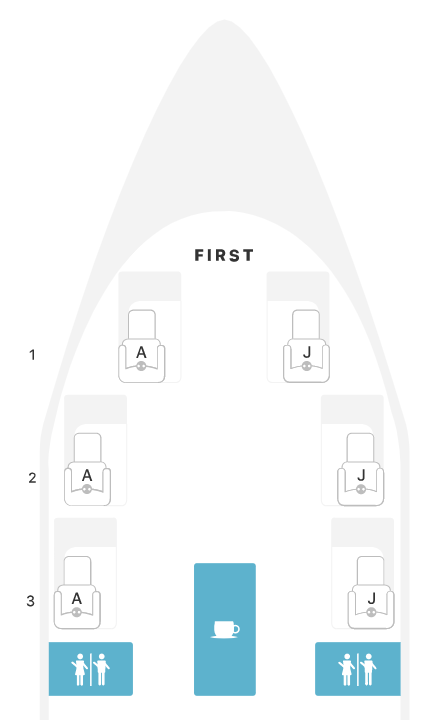
The six suites are arranged in a 1-1 configuration across three rows, meaning that all passengers enjoy direct aisle access. The best seats in the house are usually considered to be 1A and 1J, both because of the novelty of sitting in the nose of the plane, as well as the fact that you’re farthest away from the galley.
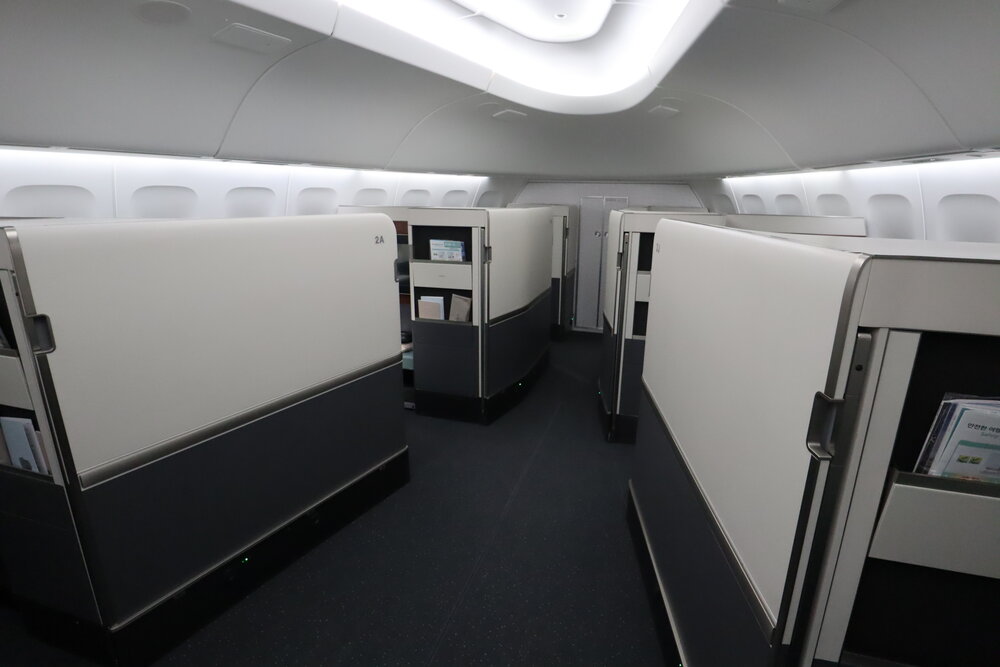
Korean Air 747 First Class – Cabin
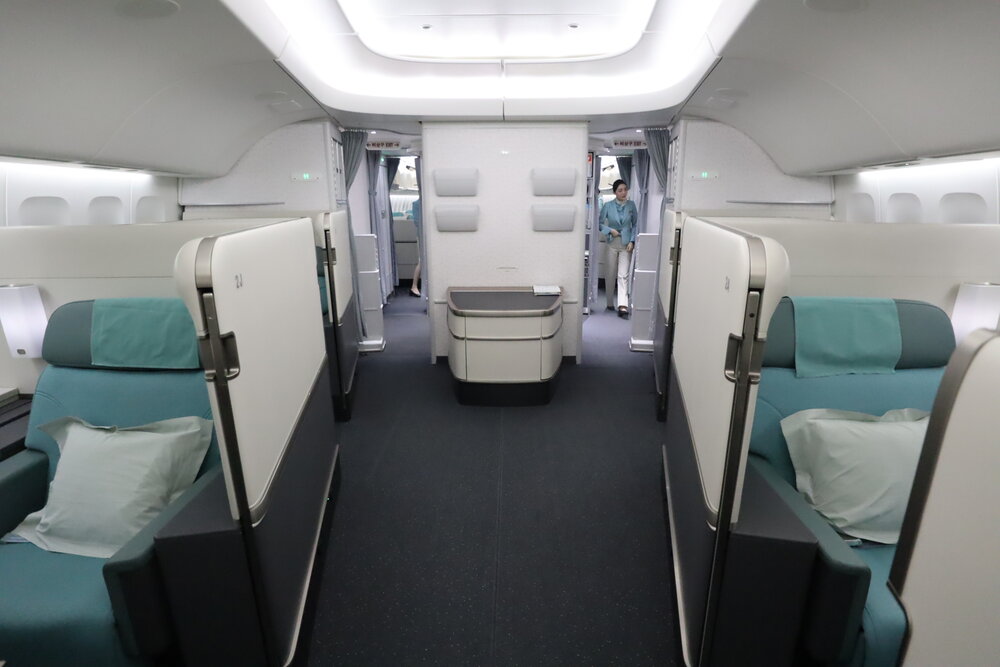
Korean Air 747 First Class – Cabin
Knowing this, I had of course secured myself Seat 1A as soon as I had booked the ticket, and I now headed to the very pointy end of the plane to make myself at home. Along the way, I passed by a small countertop at the base of the cabin, which would be used by the crew as a staging area for serving meals throughout the flight.
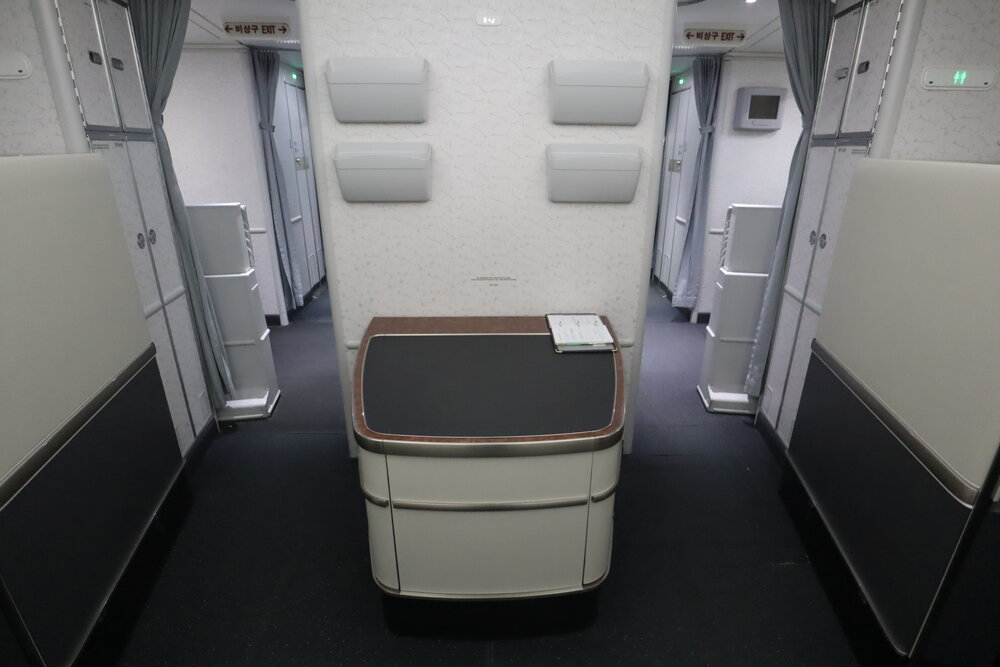
Korean Air 747 First Class – Staging area
Then, I headed down the “hallway” leading to the seats in Row 1. You’ll notice there’s a small cabinet at the end here, which is actually the wardrobe used to store passengers’ coats and carry-on bags.
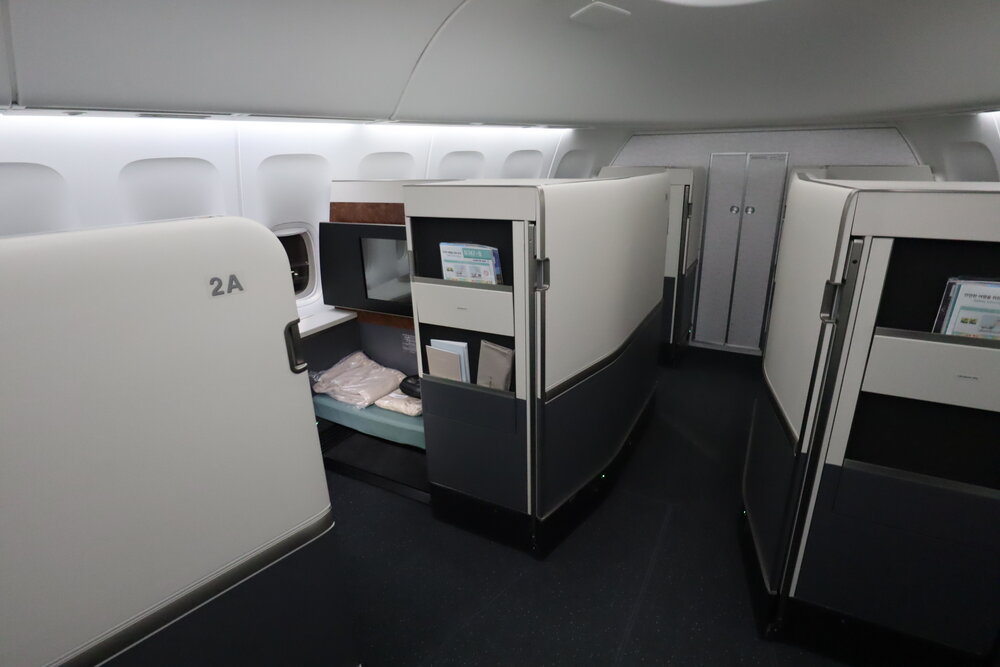
Korean Air 747 First Class – Cabin
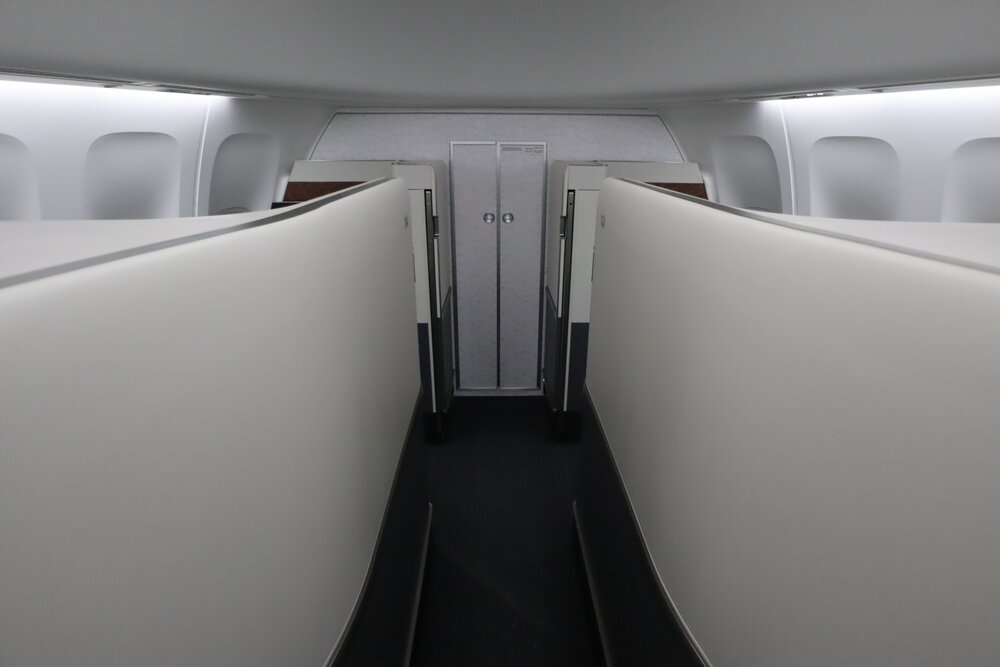
Korean Air 747 First Class – “Hallway” to Seats 1A and 1J
Korean Air 747 First Class – Seat
In terms of visuals, the Korean Air First Class cabin was much more slick and polished than I had been expecting, with the walls, carpeting, and decorative accents all exuding a contemporary air. If there were one criticism, it might be that the cabin felt overly sterile at first glance thanks to its largely monochromatic colour palette.
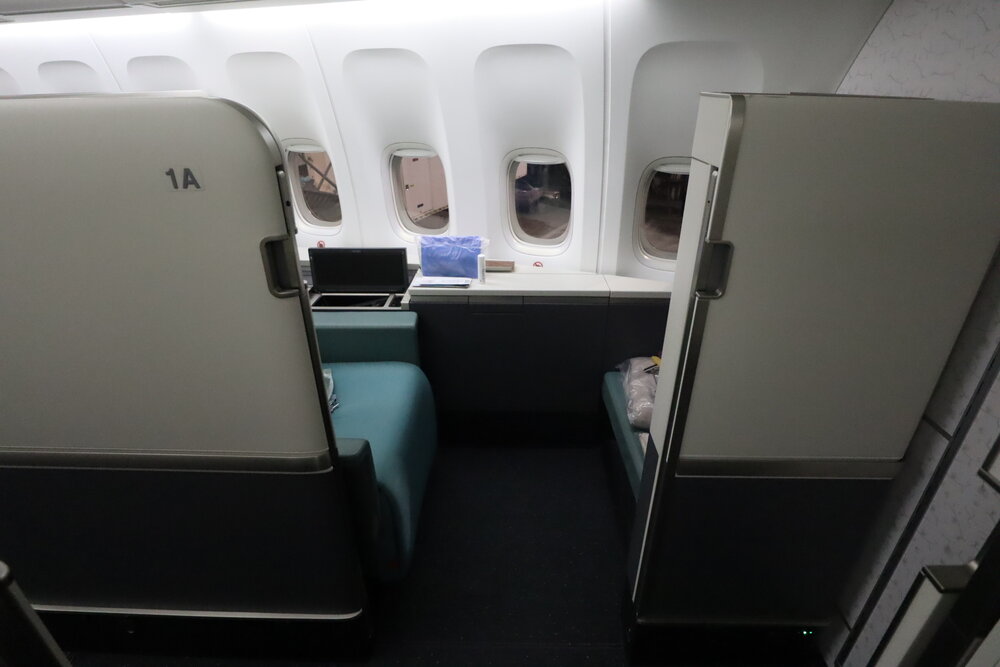
Korean Air 747 First Class – Seat 1A
And upon arriving at your suite, you’ll notice that Korean Air has indeed chosen to add a splash of colour to their seat finishes… using a bright baby blue!
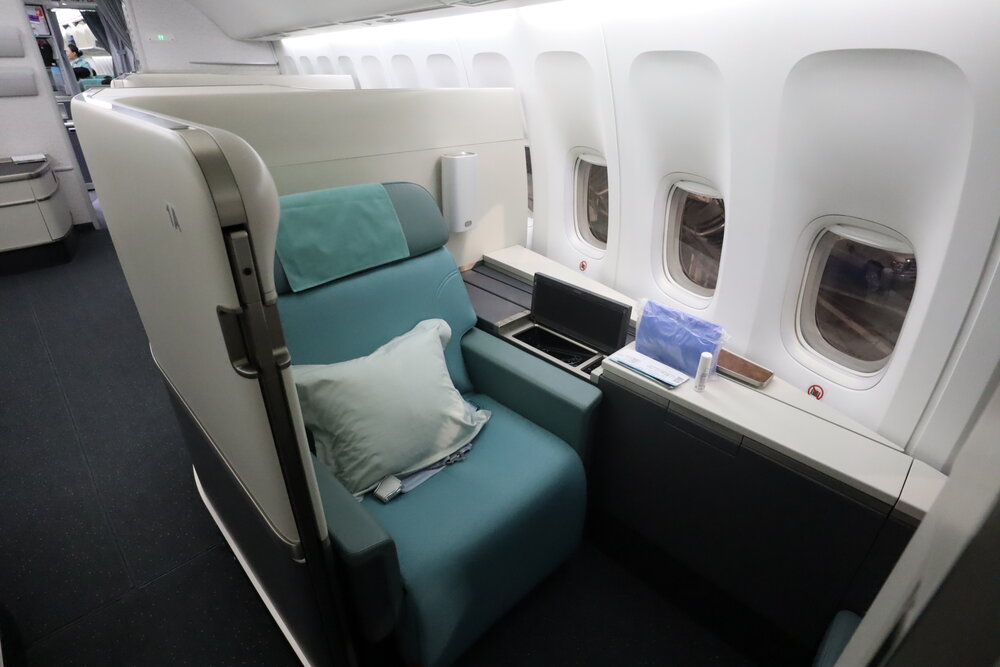
Korean Air 747 First Class – Seat 1A
Now, I’m not saying this is an ugly colour or anything… but I’m just saying that I think they could’ve chosen dozens of other colours for a better look. In my opinion, a fine black leather finish would’ve been ideal, accentuating the “luxury sports car” look of the overall cabin; instead, it was this rather regrettable shade of blue that welcomed me into its embrace as I took my seat.
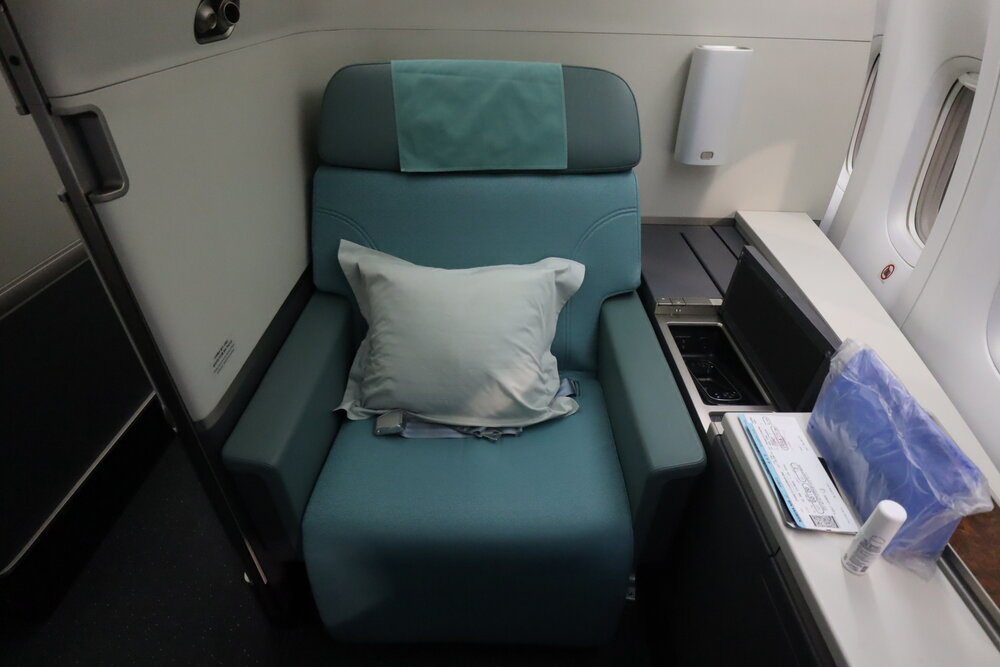
Korean Air 747 First Class – Seat 1A
Other than the surprising seat finishes, the rest of the Kosmo Suite 2.0 was very impressive. As a stalwart of commercial aviation, the Boeing 747-8 is one of the widest planes out there in terms of cabin floor space, giving every First Class suite a full 80 inches of length and 24 inches of width.
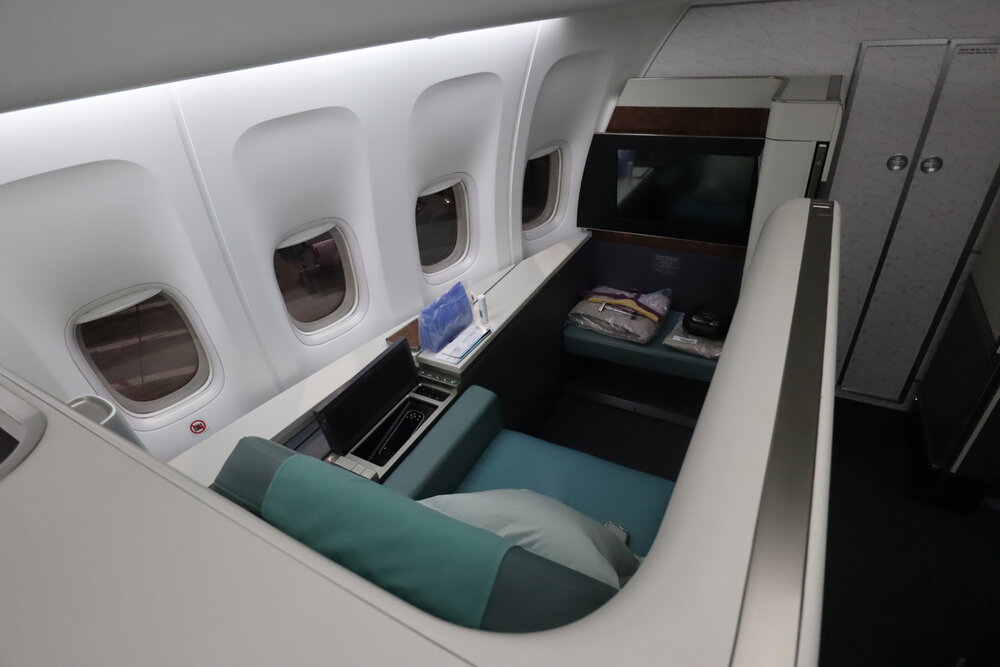
Korean Air 747 First Class – Seat 1A
Our comprehensive seat tour begins with the entertainment monitor at the very front of the suite, nestled in the curvature of the aircraft’s fuselage. Even though Row 1 is the coolest place to sit, these suites unfortunately do have slightly less space at the front, having been squeezed into the nose cone.
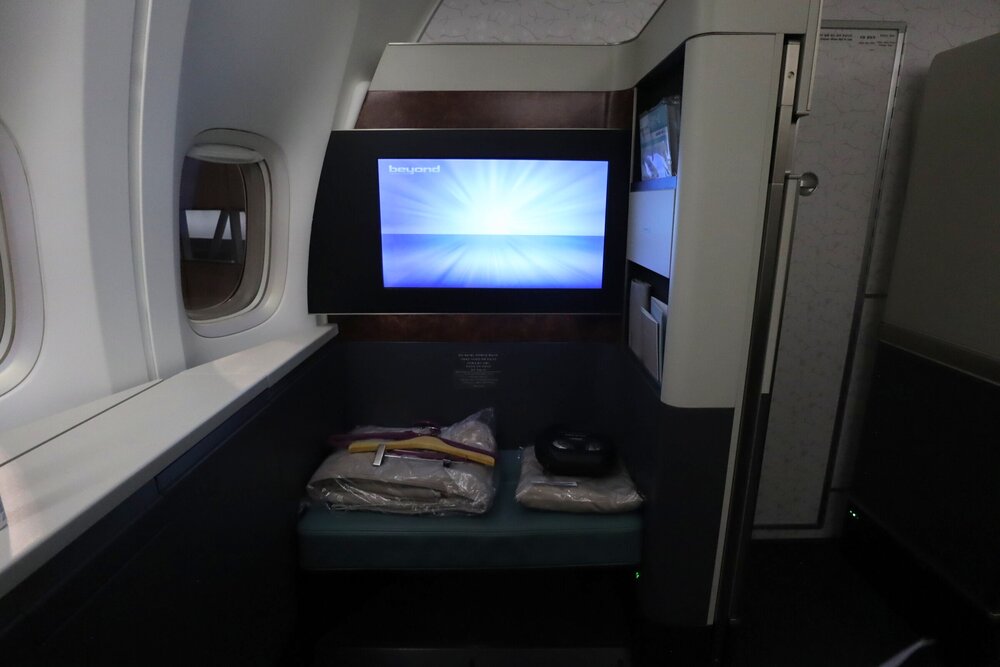
Korean Air 747 First Class – Entertainment screen
The dual literature pockets are embedded into the seat wall here, perpendicular to the TV screen. Then, below the screen is the seat ottoman, which came equipped with all sorts of amenities and accessories for the flight.
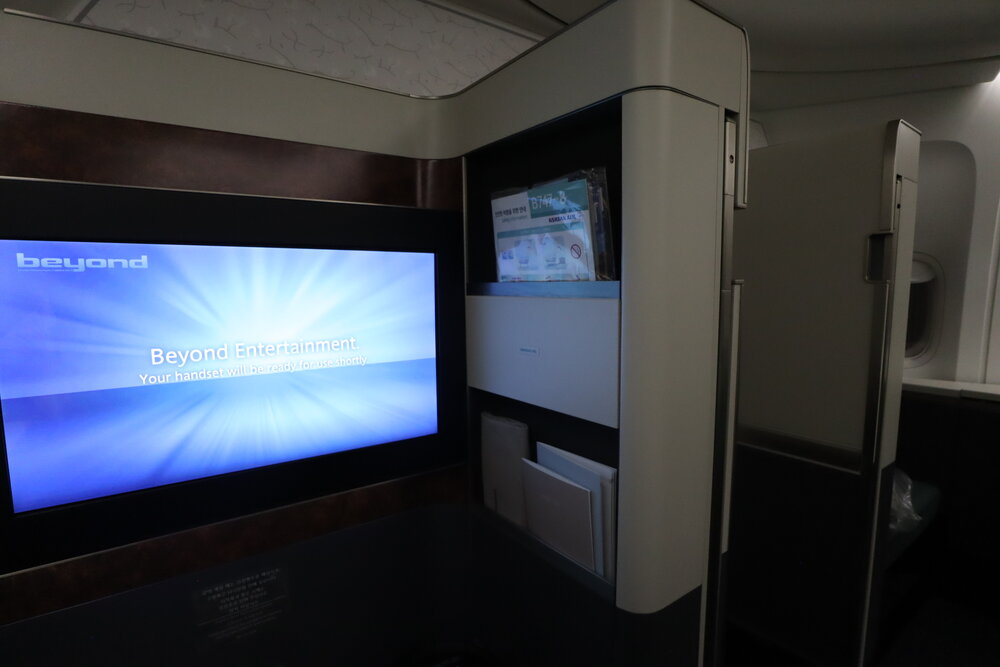
Korean Air 747 First Class – Literature pockets
Note that while the ottoman seems large enough to act as a buddy seat, it doesn’t come with a separate seatbelt, so it probably wouldn’t be suited to dining face-to-face with a companion if you were travelling together.
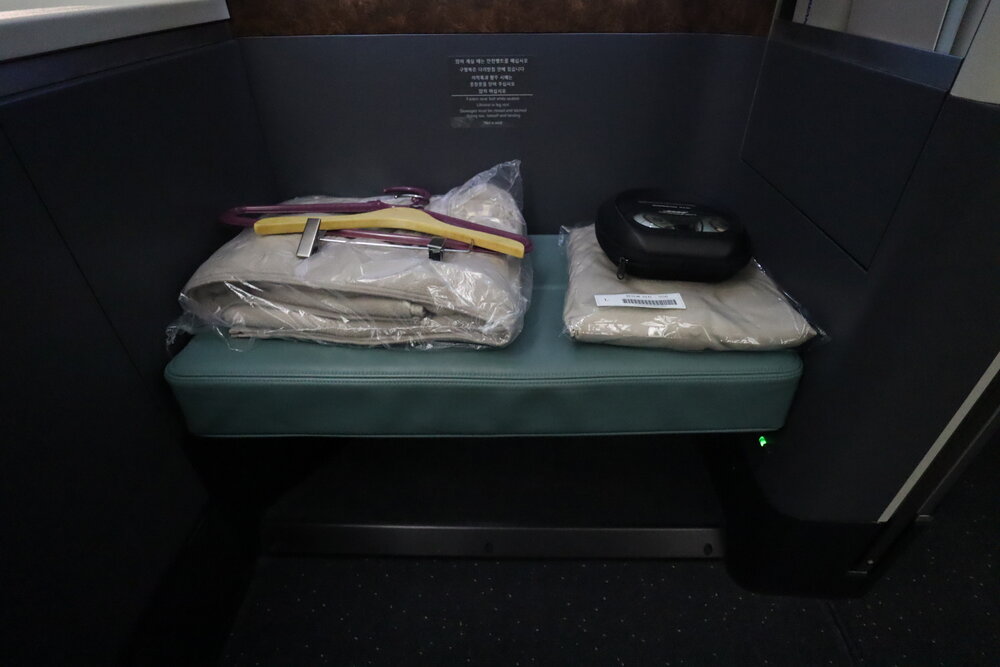
Korean Air 747 First Class – Ottoman
Underneath the ottoman is a storage space large enough for a backpack or a laptop bag; in the absence of overhead storage bins, any larger items would go into the wardrobe at the front. You’ll notice that the power outlet is also positioned just underneath the ottoman, near the doors to the suite.
Turning our attention to the seat features along the side, we see that the seat console acts as a very large open surface, giving you ample room to spread out your loose items during the flight. If you’d like a more secure surface for your drinks and snacks, then a raised wooden countertop is where you’ll put your tableware when the tray table is stowed away.
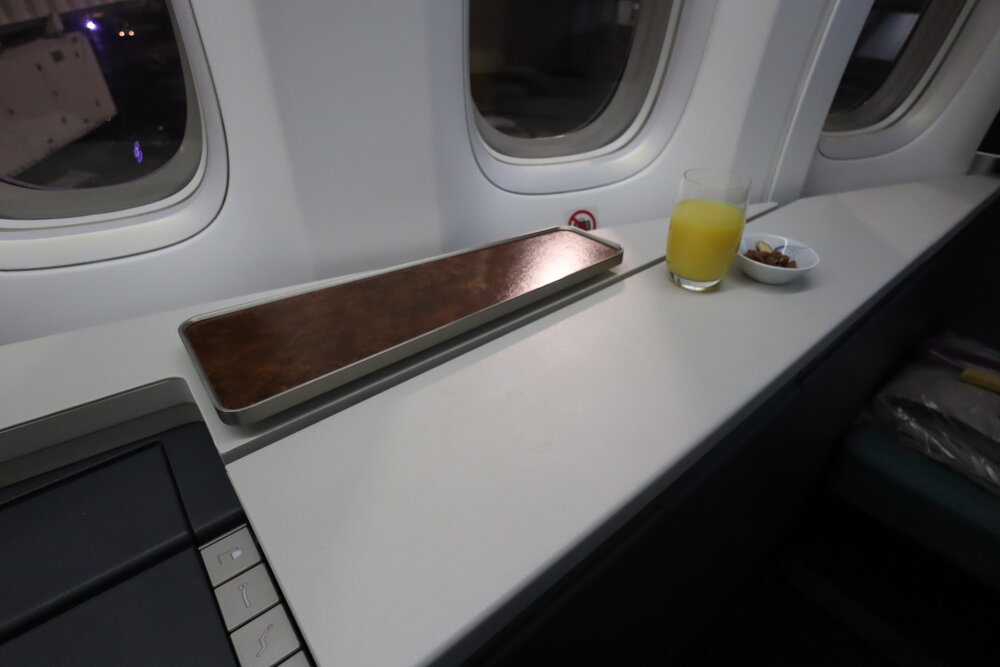
Korean Air 747 First Class – Surface space
If you do need the tray table, though, be warned that it’s quite a hefty chunk of wood, and it’ll require a fair bit of elbow grease to extract from its holder and fold over into its full size.
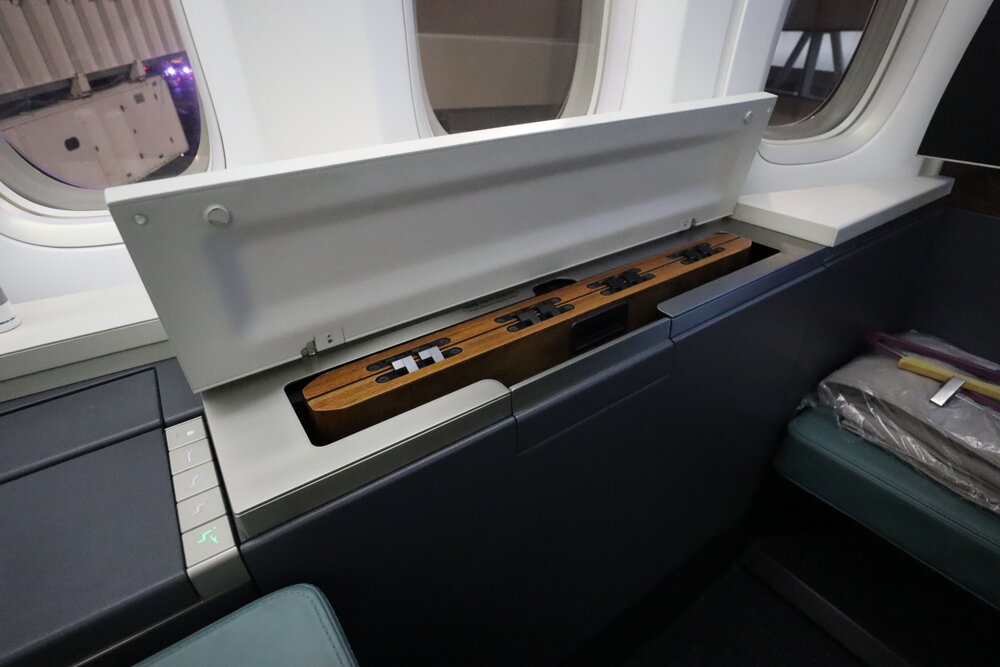
Korean Air 747 First Class – Tray table
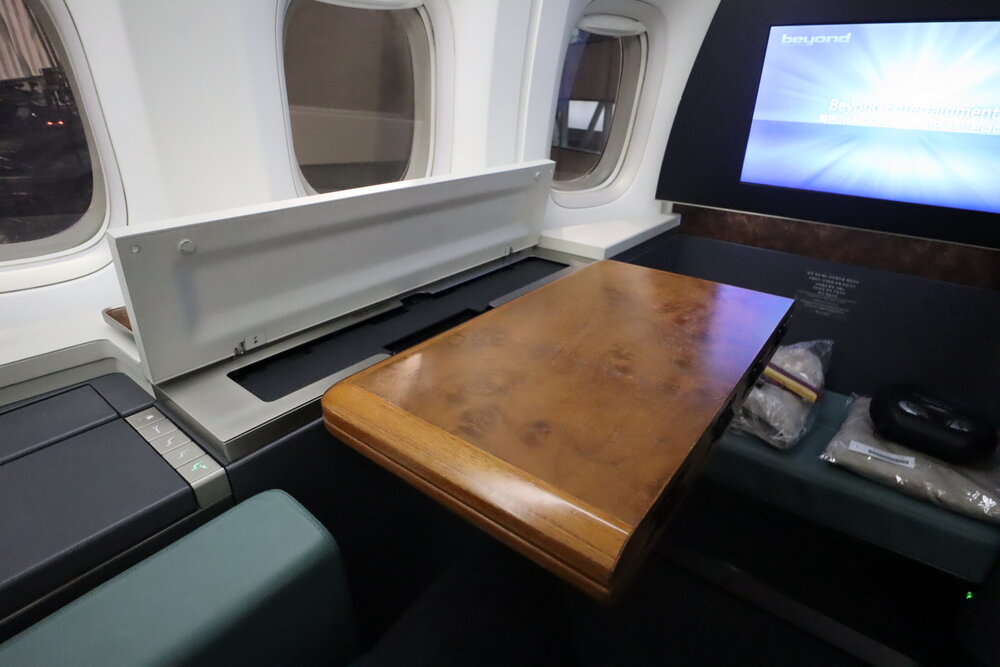
Korean Air 747 First Class – Tray table
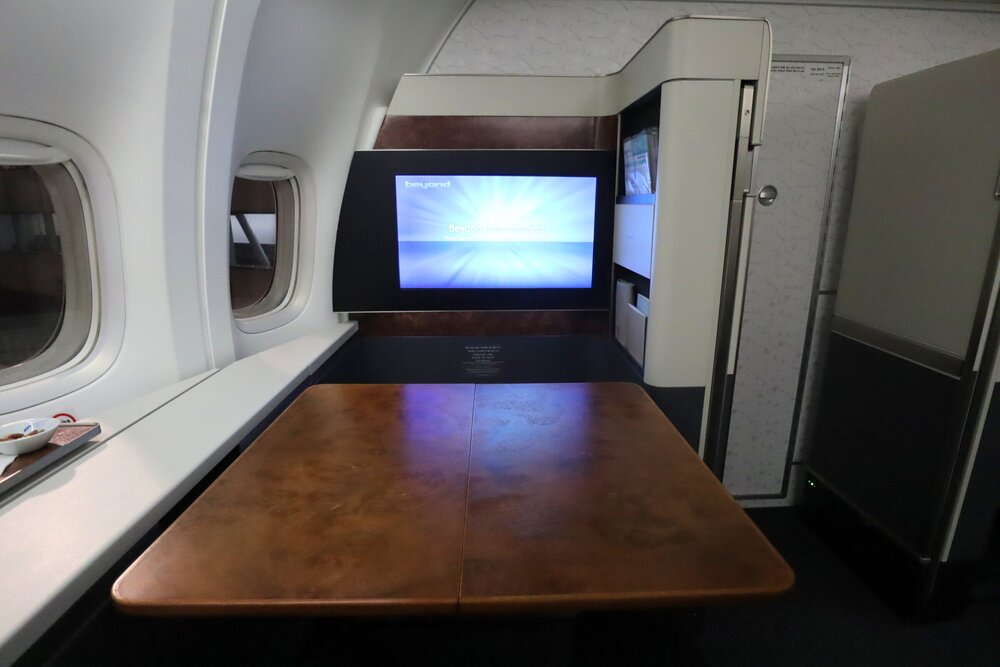
Korean Air 747 First Class – Tray table
The area between your seat and the window is jam-packed with additional buttons, switches, and storage units.
First, there’s a long and thin storage compartment, which is further subdivided into a shallow part and a deeper part. The former may be used to store a pair of glasses or some loose trinkets, while the latter would be suitable for storing a book, a tablet, or a small laptop.
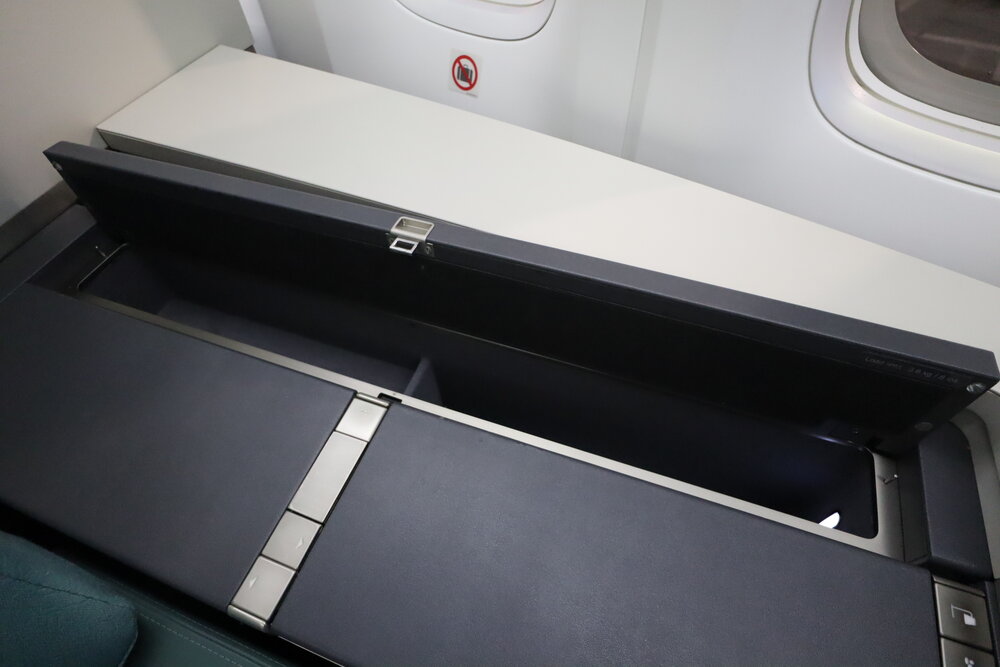
Korean Air 747 First Class – Storage compartment
Another compartment provides some extra storage space. I had stuffed my amenity kit in here while I wasn’t using it during the flight.
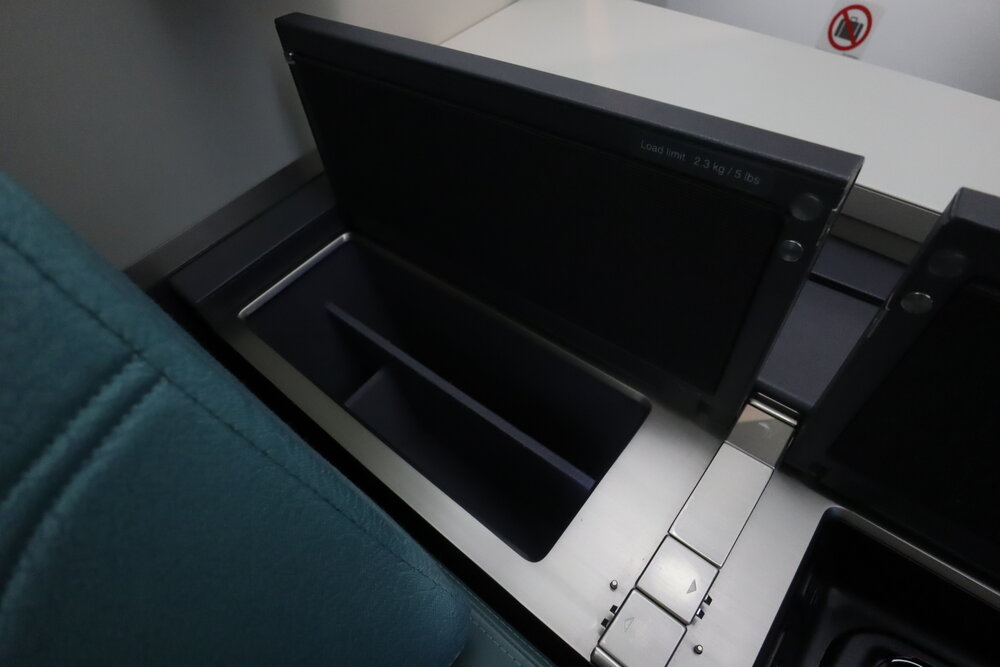
Korean Air 747 First Class – Storage nook
Finally, lifting the third hatch reveals the Panasonic entertainment controller, headphone jack, and USB power port. You’ll also notice that the seat controls are divided into two sets: a set of simple controls that allow you to flip on the lights and toggle between various default modes, as well as another set of controls that lets you fine-tune the seat cushions to your exact liking.
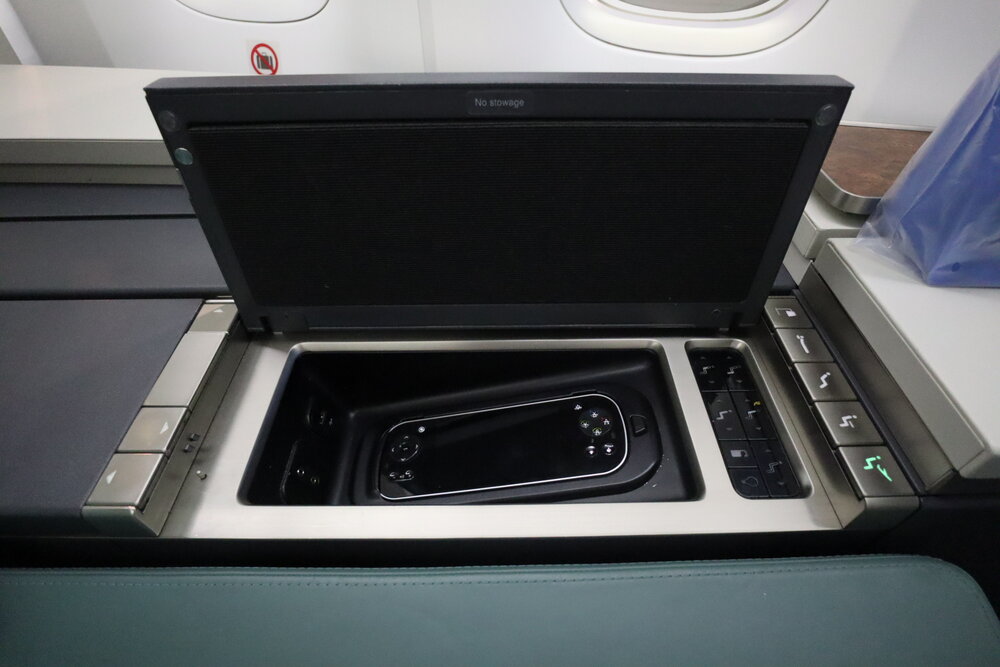
Korean Air 747 First Class – Entertainment controller & seat controls
The main light fixture in your suite is this minimalistic lamp that can be toggled between four different degrees of brightness, while there’s also another set of reading lights on the opposite seat wall.
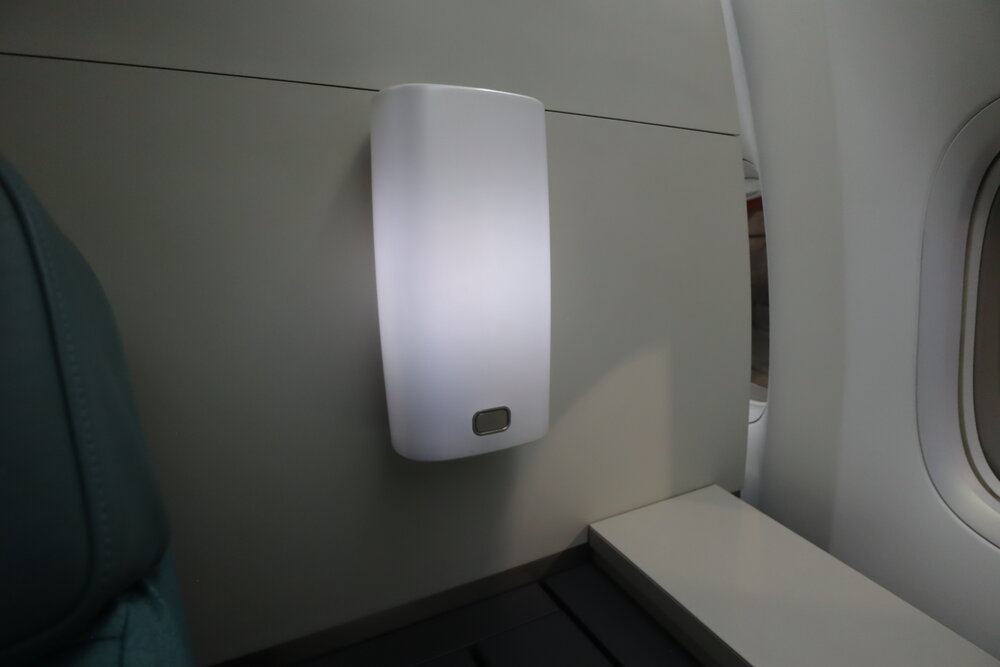
Korean Air 747 First Class – Lamp
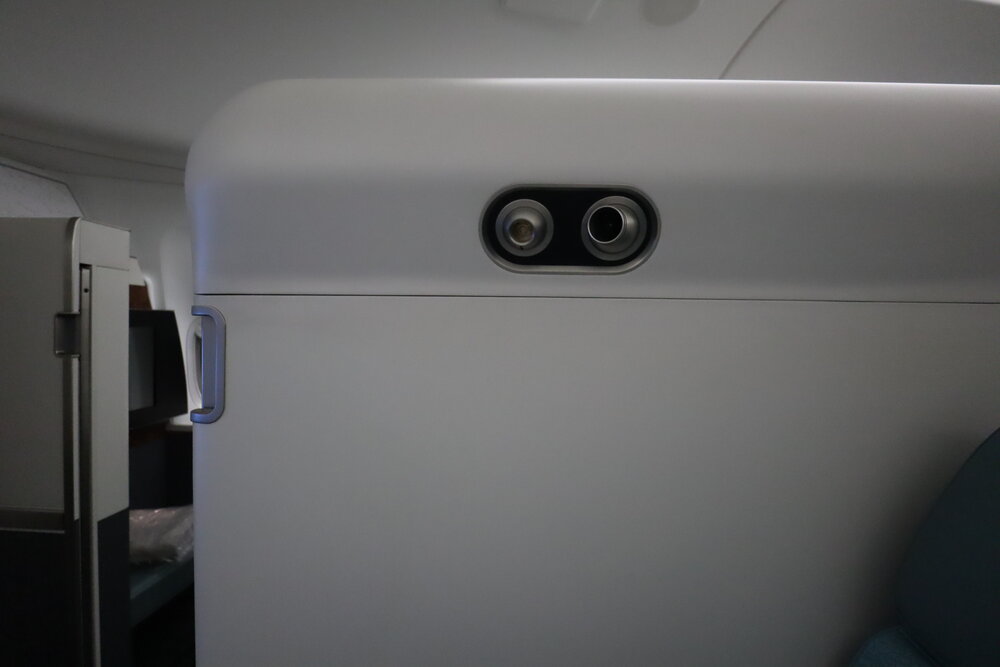
Korean Air 747 First Class – Reading light
The last notable feature within this Kosmo Suites 2.0 design is, of course, the sliding doors to each suite, which can be closed fully to give you maximum privacy. These doors were locked in place before takeoff, though, so I’ll show you what it looks like with the doors closed later on.
Even without the doors closed, though, you truly have an incredible amount of privacy here in the very front row. This is the view of the rest of the cabin when you’re standing up; otherwise, if you’re sitting down, you really do feel blissfully blocked-off from everyone else on the plane.
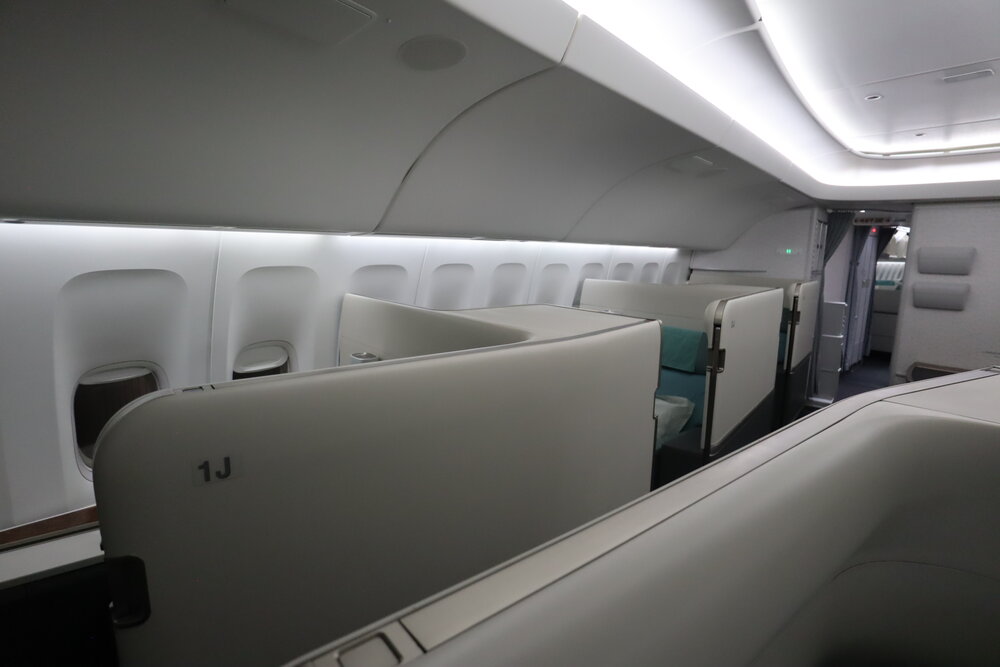
Korean Air 747 First Class – Cabin
Korean Air 747 First Class – Amenities
The crew member who had shown me to my seat now had asked if she could hang up my coat (which, conveniently, went into the wardrobe right at the front of the cabin), as well as if I’d like a pre-departure beverage to sip on before takeoff.
I optimistically asked, “Champagne?”
However, Korean Air is one of those airlines that doesn’t serve alcohol prior to takeoff when departing the US to avoid paying local duties, so I was happy to accept a glass of orange juice for now.
The juice was served with a ramekin of almonds, which I was slightly disappointed to find was cold and stale, rather than warm and toasty.
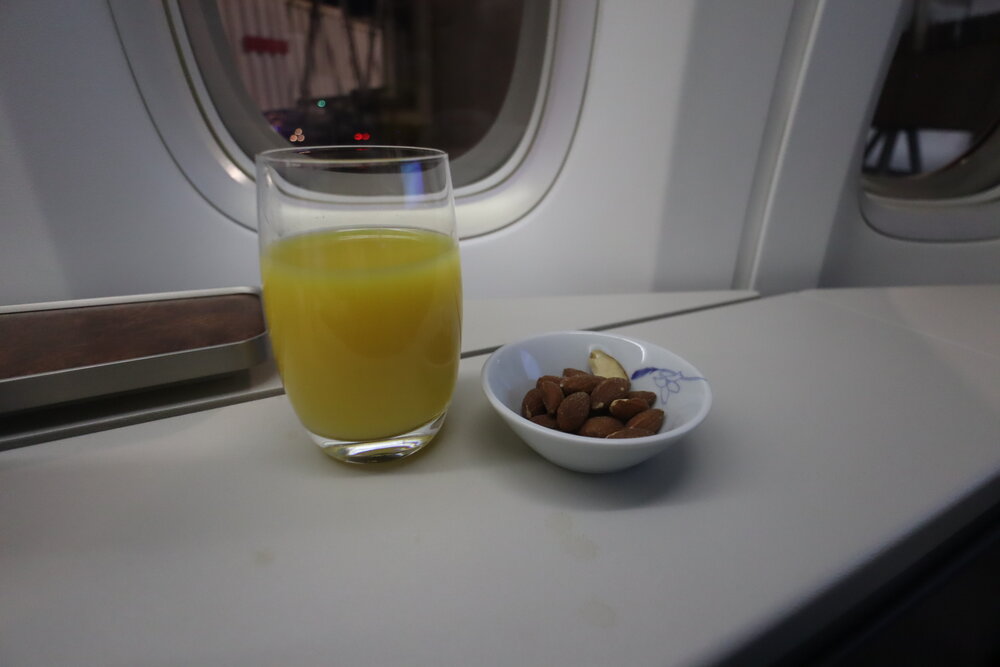
Korean Air 747 First Class – Welcome beverage
As I sipped on my juice and took some shots for my YouTube video, the crew members working the First Class cabin came by to introduce themselves one-by-one and wish me a good flight.
I’d note that one or two of the flight attendants didn’t have the most fluent command of English; however, everyone was very friendly and quite curious about my photography and videography (of course, I proactively apologized if my antics would cause them any inconvenience throughout the flight).
There were two other passengers travelling in First Class tonight, and to my great satisfaction, they each took up their seats in 2A and 3A, leaving 1J next to me unoccupied and giving me absolute peace and quiet in the nose of the plane.
As we waited for takeoff, I took this time to check out all of the little items that had been left at my seat, starting with the amenity kit. Korean Air offers First Class passengers an amenity kit made of rubber, which I must say lacks that “premium” feeling compared to the leather or hard-shell kits offered by other airlines.
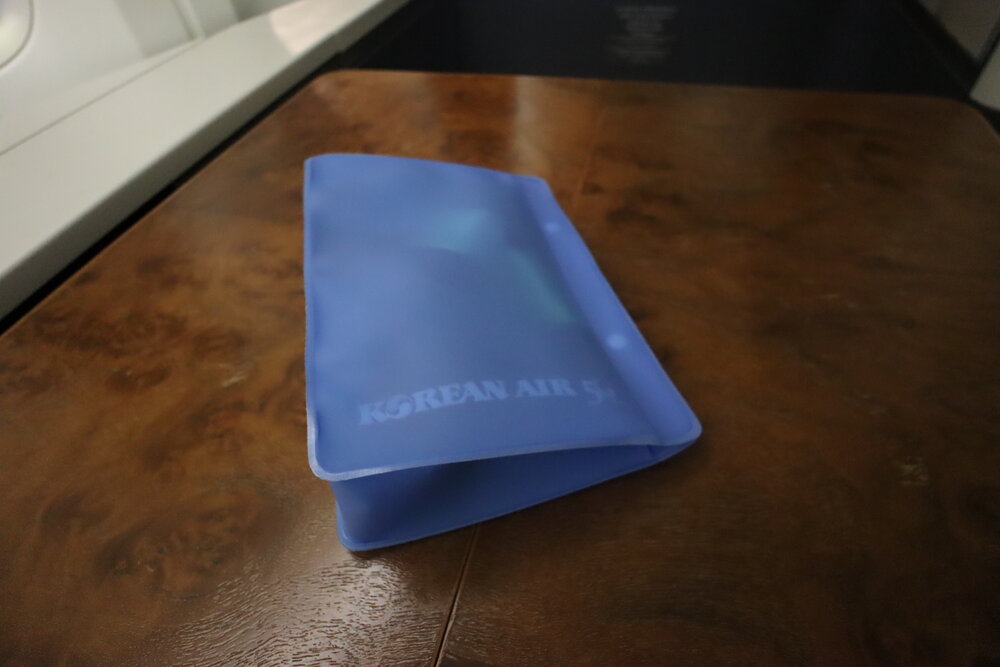
Korean Air 747 First Class – Amenity kit
The actual contents of the kit were a slightly better showing: the men’s kit comes with body lotion, aftershave lotion, hand cream, lip balm, and face cream courtesy of Parisian perfumery Atelier Cologne, in addition to a dental kit, eye mask, shoe horn, and even a mineral water spritzer.
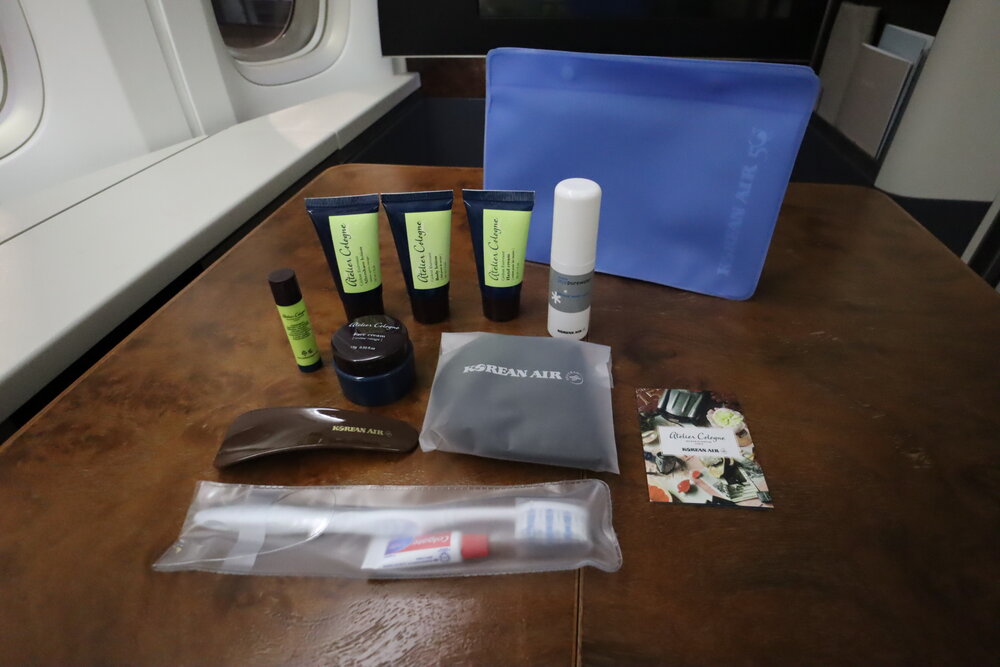
Korean Air 747 First Class – Amenity kit contents
Then there were the pajamas, which were pretty unique in that they consisted of a button-down top (instead of the usual pullover), but I couldn’t help but wish that they came in a more stylish colour than a shade of beige that was just as drab as the baby-blue seat finishes.
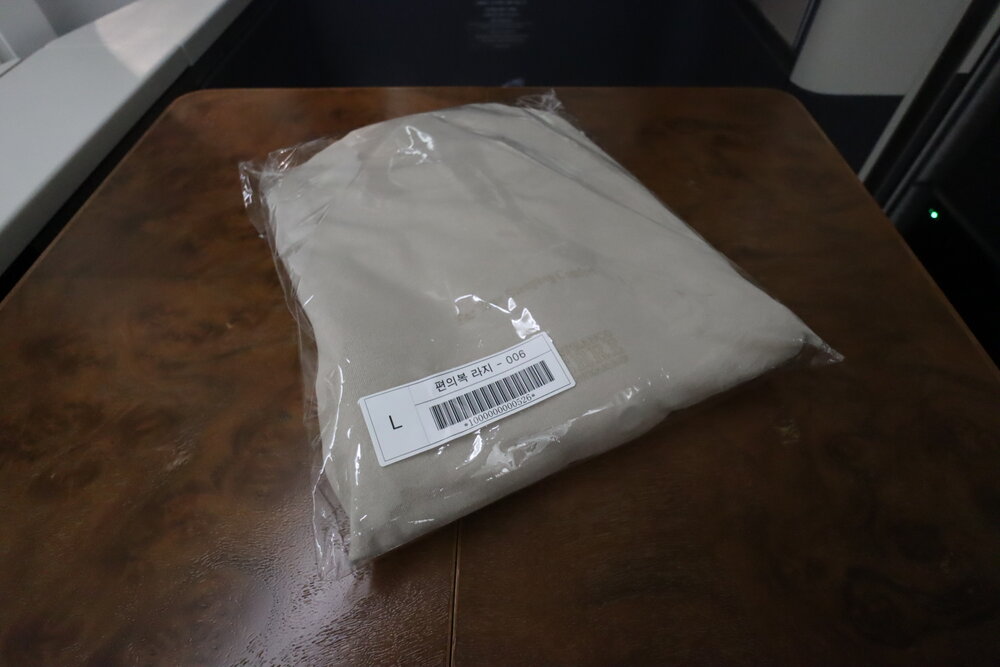
Korean Air 747 First Class – Pajamas
The Bose headphones and the in-flight menus rounded out the items. Shortly before takeoff, the lead flight attendant came by to take my order for the supper service, which would commence very soon after the flight began.
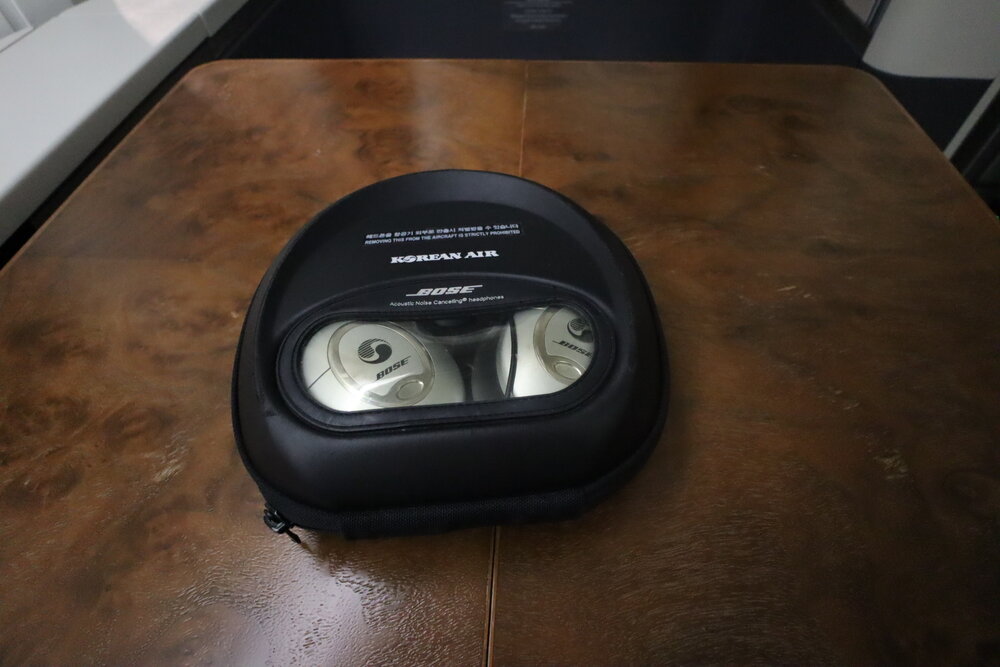
Korean Air 747 First Class – Headphones
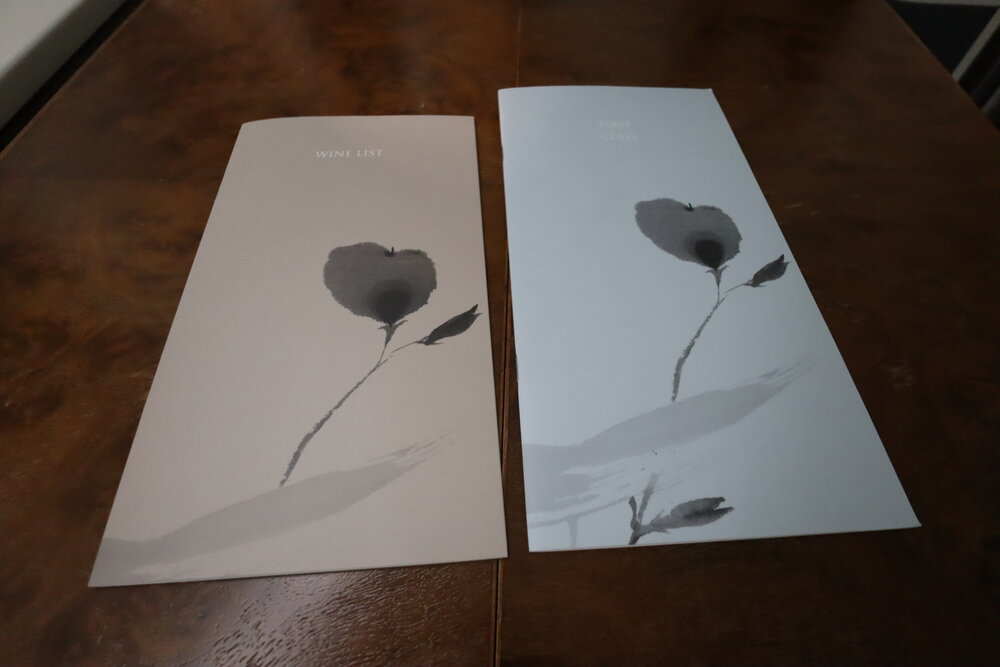
Korean Air 747 First Class – Menus
The menu read as follows:
Meanwhile, the wine and beverage list read as follows:
As we geared up for takeoff, Korean Air’s ingenious safety video, featuring K-pop group SuperM, played on the screens. The safety video did a great job of presenting all the information in a creative way, and t’s worth a watch for the funky dance moves alone:
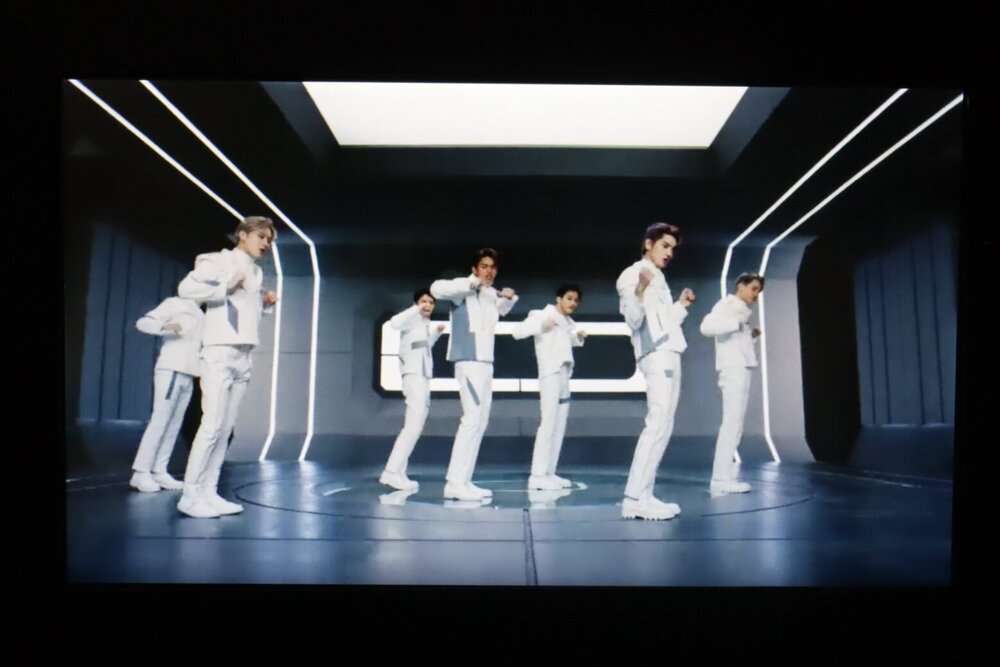
Korean Air 747 First Class – Safety video
Upon reaching cruising altitude, the doors on the suites were now unlocked, and could be closed for maximum privacy.
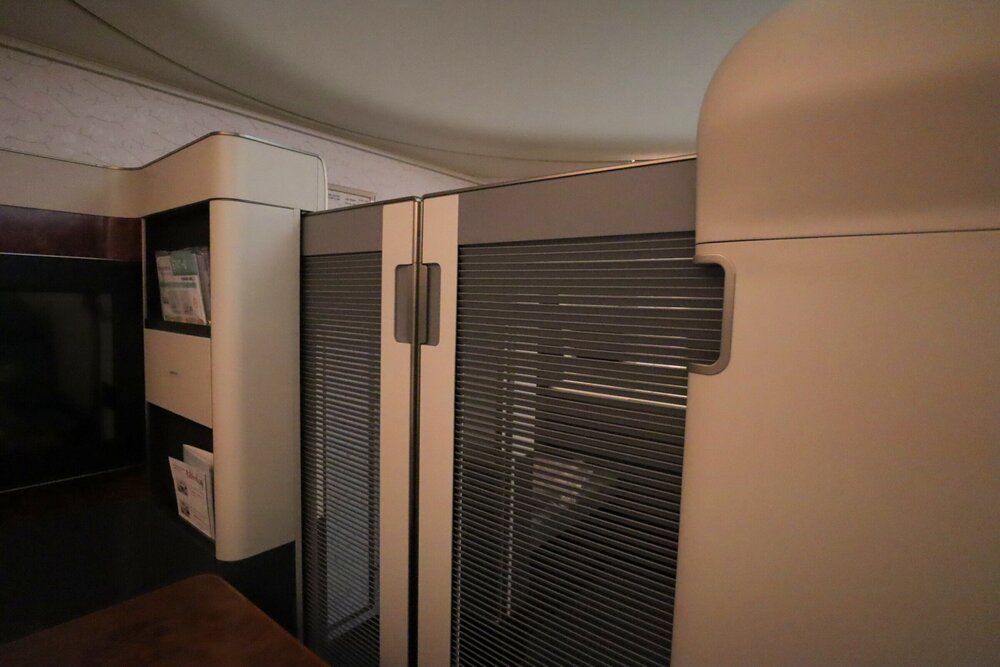
Korean Air 747 First Class – Doors closed
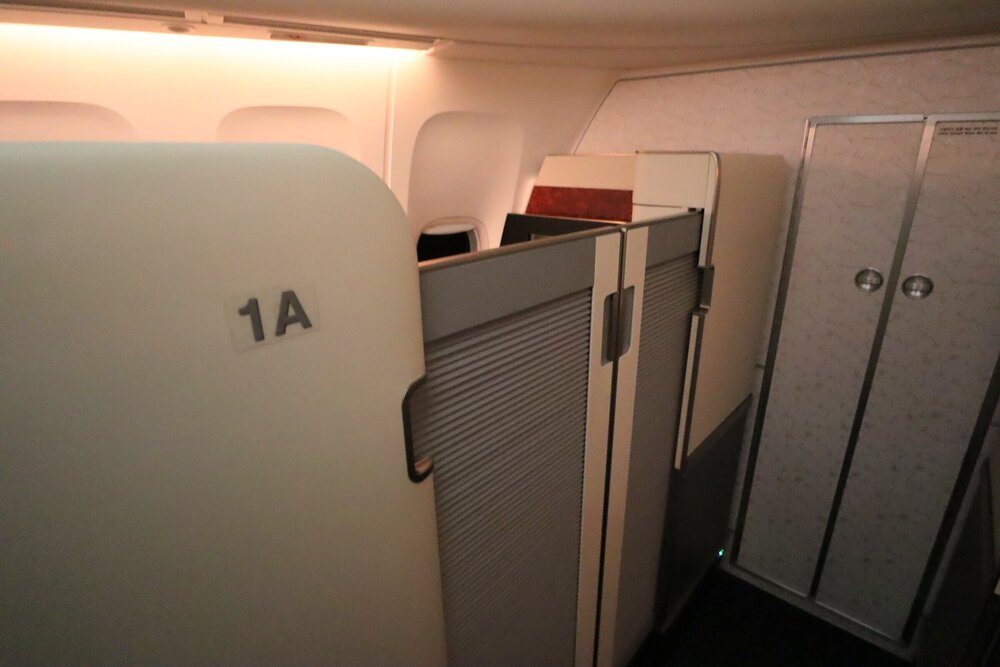
Korean Air 747 First Class – Doors closed
Korean Air carries a noticeably reduced menu in First Class for these overnight flights, when passengers would presumably be sleeping for most of the flight. This was a similar experience to my flight on ANA First Class a few years ago too, so I really gotta remember to avoid these overnight Pacific crossings if I want to get the full experience.
Usually, Korean Air would offer distinct full Korean and Western menus, but for tonight’s supper menu only consisted of one possible appetizer followed by one of three possible main courses. I had ordered the single dish I always get when flying with Korean airlines: bibimbap.
Korean Air 747 First Class – Meal Service
Supper began with a hot towel being handed out (always accompanied by the words “please be careful”), followed by a glass of Perrier-Jouët’s prestige label champagne, Belle Epoque 2012, which was a joy to sample.
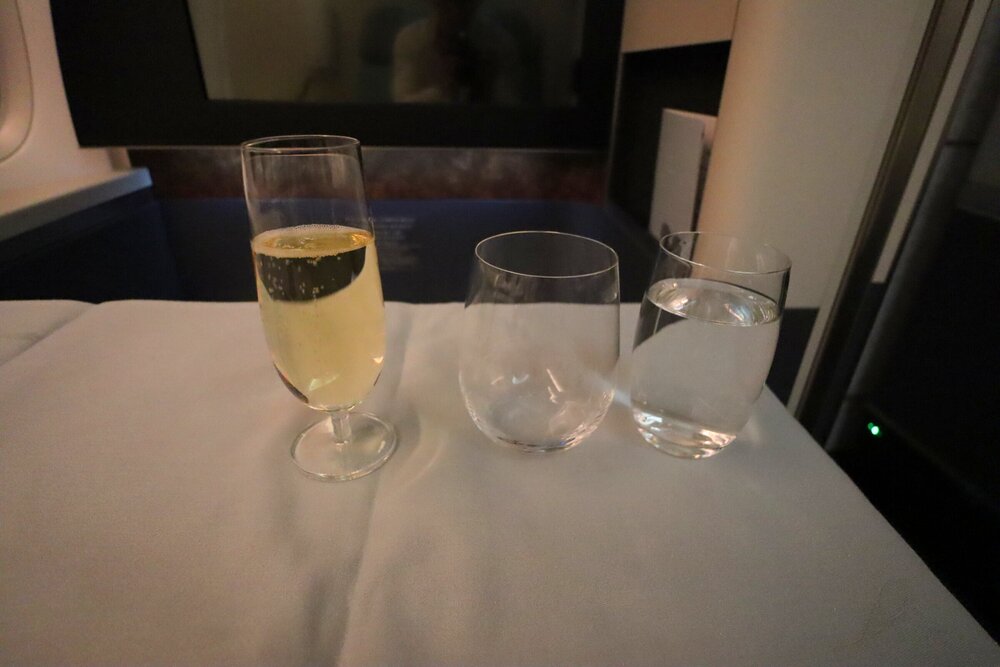
Korean Air 747 First Class – Champagne
That came delivered with the appetizer, which was a generous helping of tuna tartare prepared in sesame oil and wasabi sauce, along with some scallop skewers with lemon juice and ketchup. As this was the only appetizer option on the reduced menu, it made sense that it would combine both Eastern and Western influences through seafood, an ingredient much-loved by both cuisines and indeed one of my personal favourites.
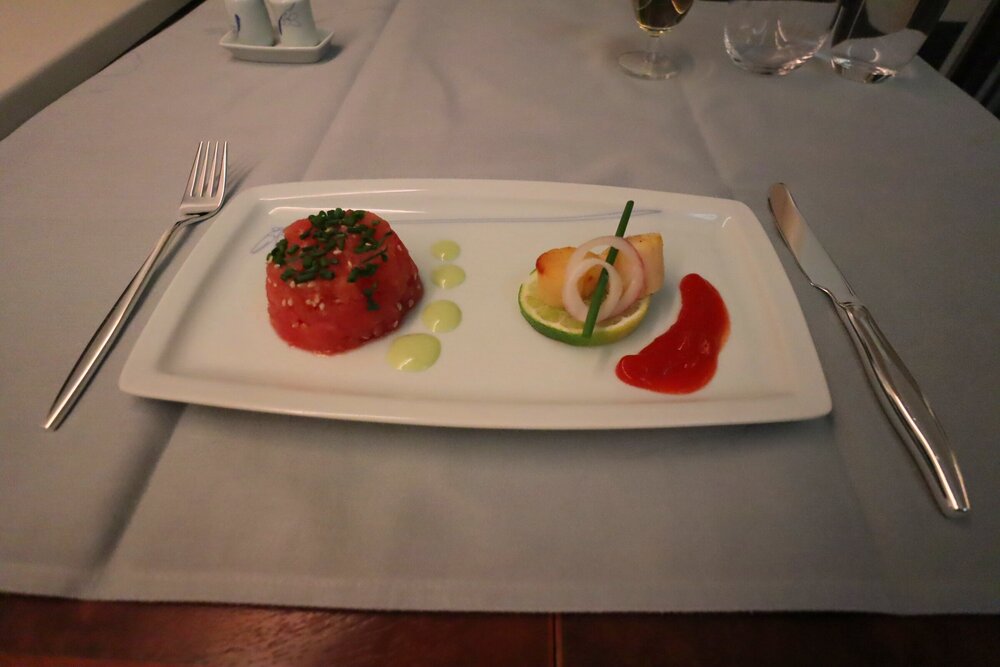
Korean Air 747 First Class – Tuna and scallop appetizer
Even though I approached the dish with high expectations, I still thought the two sets of contrasting flavours melded together exquisitely, getting the meal off to a wonderful start.
Next up was the main event: the colourful bibimbap presentation. To serve all the assorted tableware for this dish, the crew member made use of the staging area near the back of the First Class cabin, hand-delivering each plate one by one.
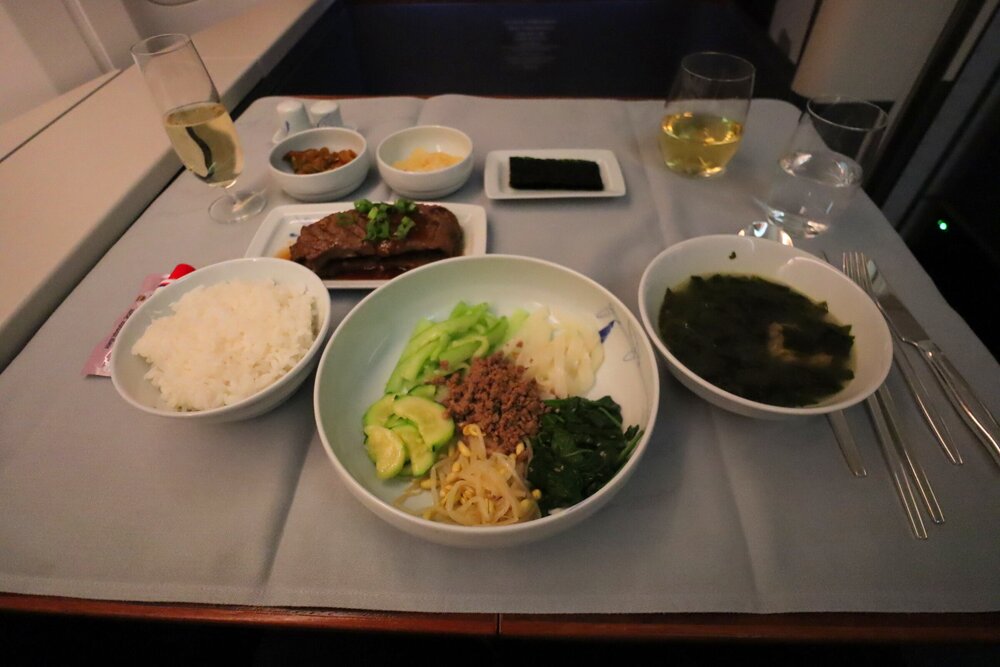
Korean Air 747 First Class – Bibimbap presentation
The attention to detail in the presentation was very impressive. You’ll notice that the tableware features the white forsythia flower on it, a plant that’s endemic to the Korean Peninsula and designated one of South Korea’s natural monuments.
The bibimbap bowl was arranged beautifully, along with some warm rice, beef bulgogi, seaweed soup, a small plate of seaweed for mixing with the bulgogi, and a few Korean staples as side dishes. Then, of course, we had the little tube of gochujang sauce and a packet of sesame oil, to combine with the rice and bibimbap ingredients into a delicious bowl of mixed goodness.
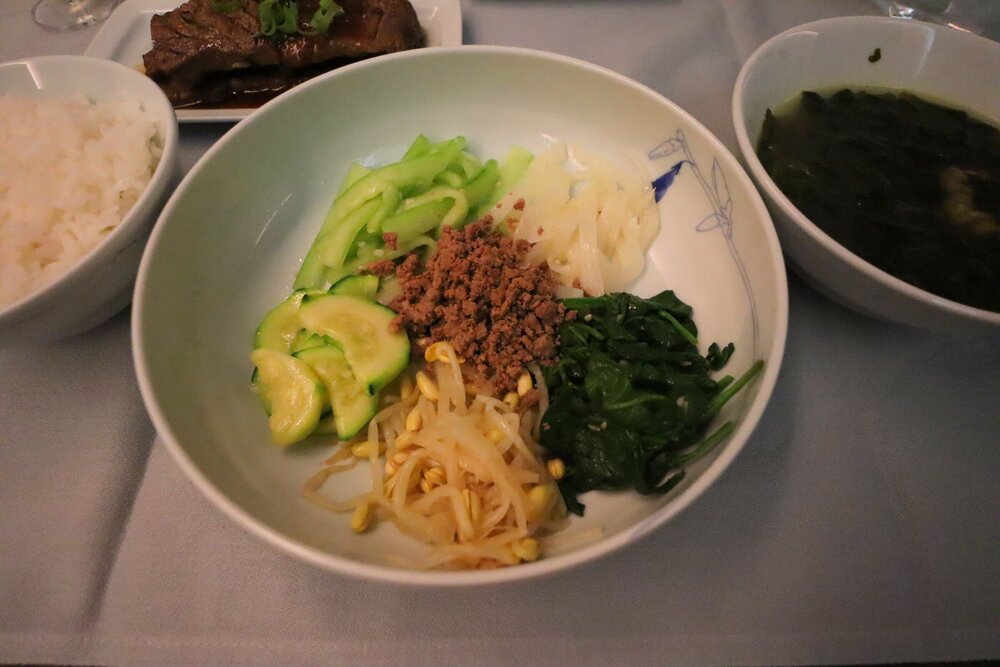
Korean Air 747 First Class – Bibimbap
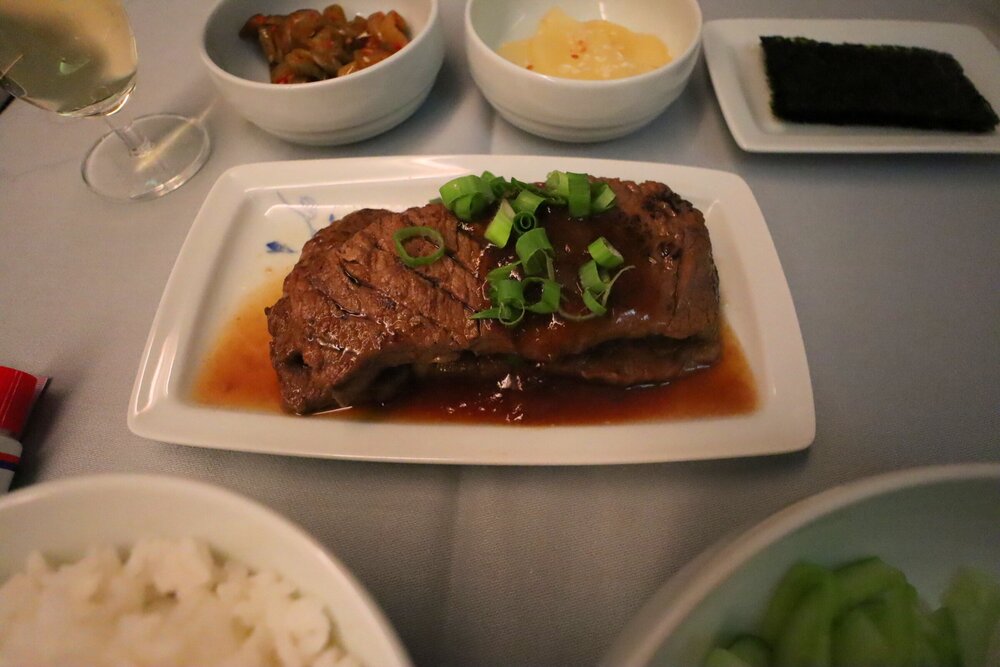
Korean Air 747 First Class – Beef bulgogi
The meal was even accompanied by a helpful pamphlet for anyone who hasn’t eaten bibimbap before.
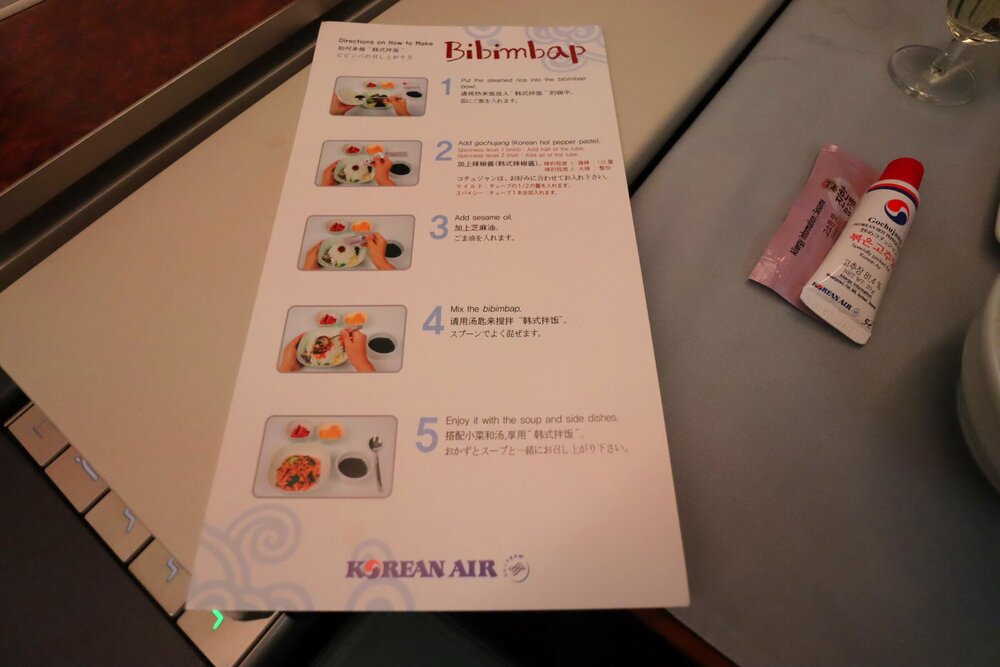
Korean Air 747 First Class – Bibimbap pamphlet
To drink, I enjoyed a top-up to my champagne, but also decided to sample some of the Chablis Premier Cru white wine as well.
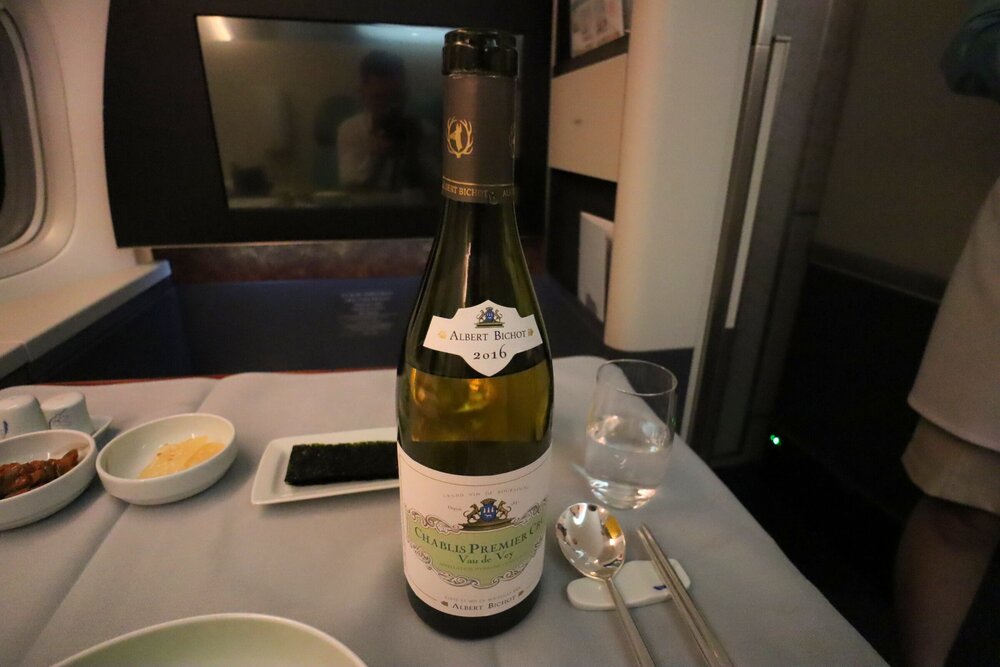
Korean Air 747 First Class – White wine
I would spend the next 30 minutes or so slowly working my way through the bibimbap and bulgogi dishes, which, to Korean’s credit, was a very generous serving of food. I found the dishes to be just as delicious as what I had enjoyed at some of my favourite Korean restaurants over the years, only dressed up in a much more luxurious setting.
I suppose that bibimbap and bulgogi aren’t necessarily the most premium foods to be eating in the sky, especially when compared with, say, the multi-course kaiseki meals that you might find on Japan Airlines First Class. Nevertheless, I still love the experience of savouring such a delicious and wide-ranging meal in First Class, so I can’t say I mind that too much.
The service flow throughout the meal was attentive, albeit slightly reserved in terms of how the crew members conducted themselves. For example, when checking up on whether I had finished my meal, the crew members would surreptitiously peek around the corner to see how I was doing, and then move away without saying anything (perhaps only a little nod) and come back later.
It was in line with my experience on Asiana Airlines First Class a few years ago, when I found Korean flight attendants to be more reserved and deferential compared to the warm and enthusiastic service culture I’ve experienced on other Asian and Western airlines.
Anyway, it took me a while, but eventually I managed to finish off all the food on my plate. It was then time for the dessert service, which would consist only of a seasonal fruit plate, rather than the more involved cheese and dessert courses that we would’ve seen on the regular menu.
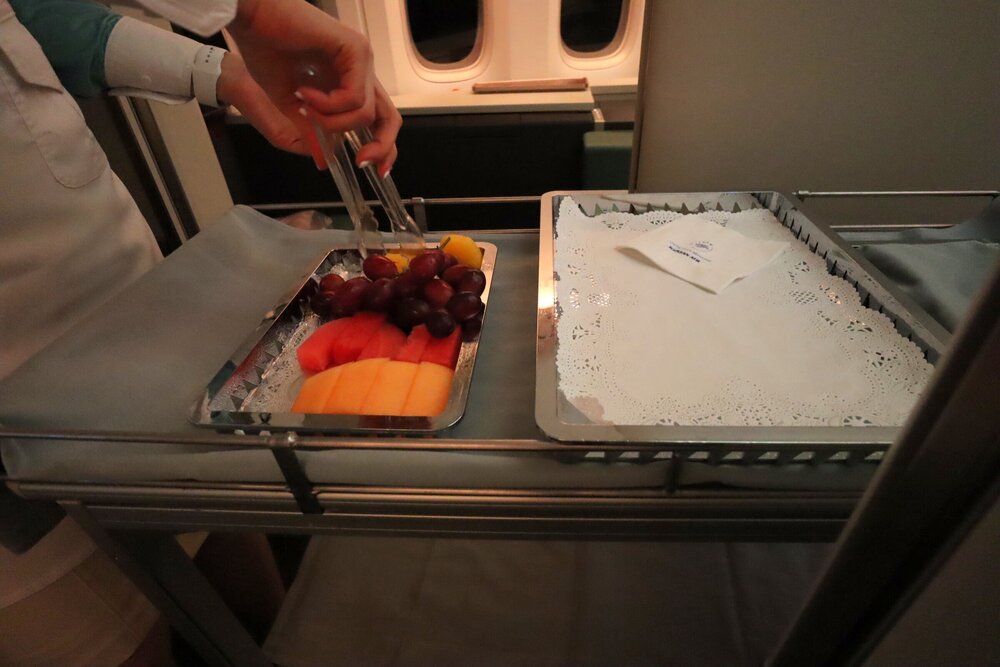
Korean Air 747 First Class – Fruit plate service
The service continued to impress, though: an entire platter of fruits was brought over on a tray, and then I was invited to choose the exact set of fruits I’d like to have, which was then plated right in front of my eyes.
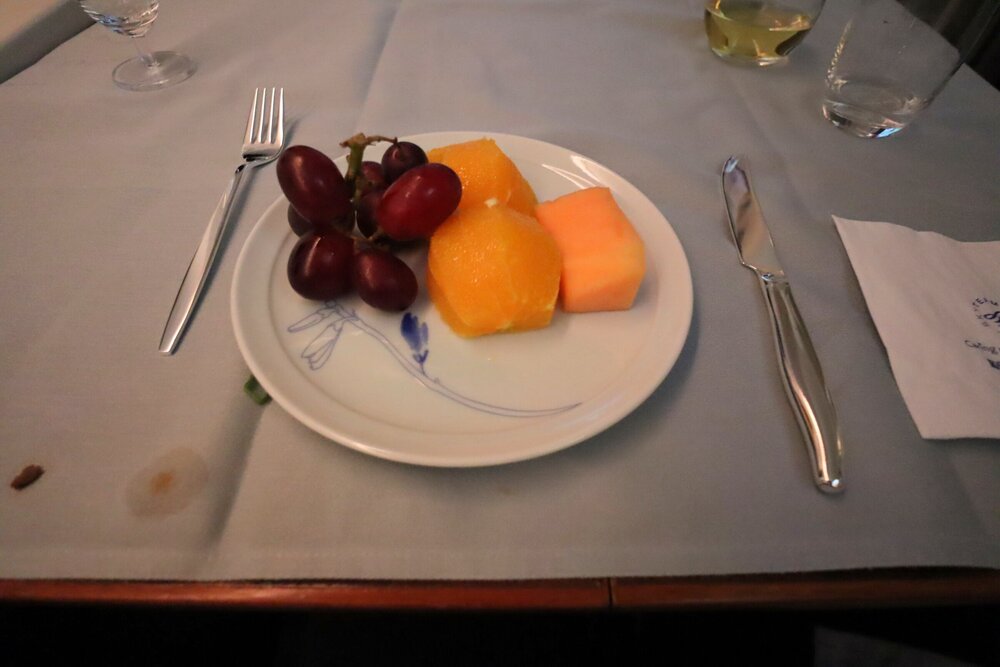
Korean Air 747 First Class – Fruit plate
I also asked for a pot of green tea to conclude the meal. There’s that white forsythia flower design on the teapot again, which sets the First Class tableware apart from what’s used in other cabins of service.
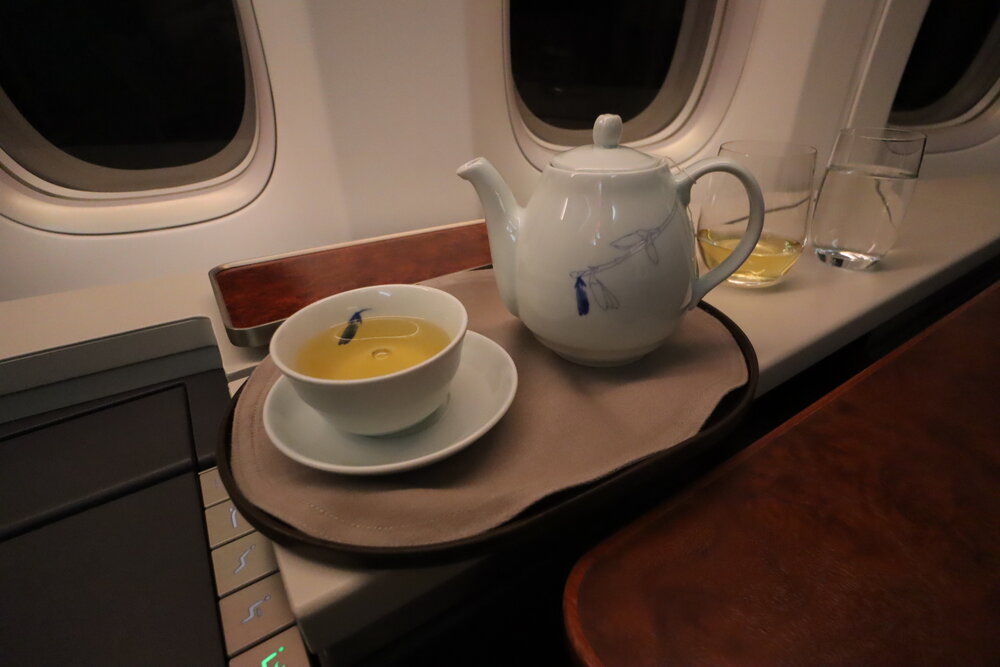
Korean Air 747 First Class – Green tea
About two hours of the flight had passed by now, which meant that we were approaching 3am local time, so I was naturally getting quite sleepy.
Korean Air 747 First Class – Bed
I elected to head to the restroom to change into my pajamas, along the way asking the flight attendant if she could prepare my bed in Seat 1J. As soon as I knew no one else was sitting opposite me, I had my eye on making that seat my bed for the night!
The flight attendant agreed to do so, but not before showing me all the way to the bathroom (even though I could easily find it on my own, of course), holding the curtain open for me, and then holding open the bathroom door as well. Talk about wonderful service!
The Korean Air First Class bathrooms on the Boeing 747 are very spacious, although they don’t come with a window.
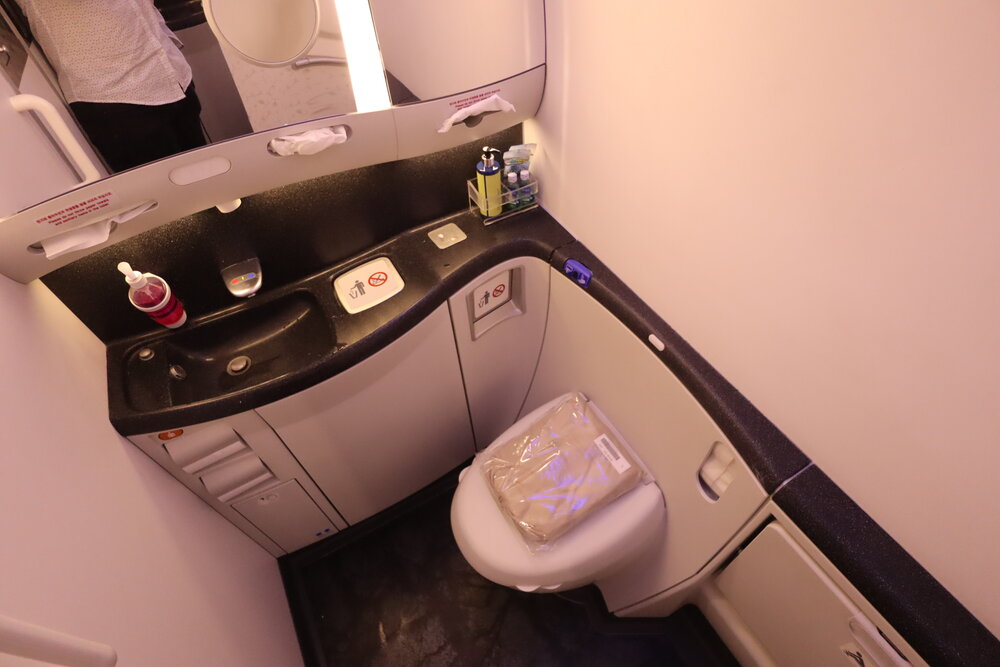
Korean Air 747 First Class – Restroom
There’s a small changing table, as well as dental kits, disposable razors, and Atelier Cologne hand lotion as amenities.
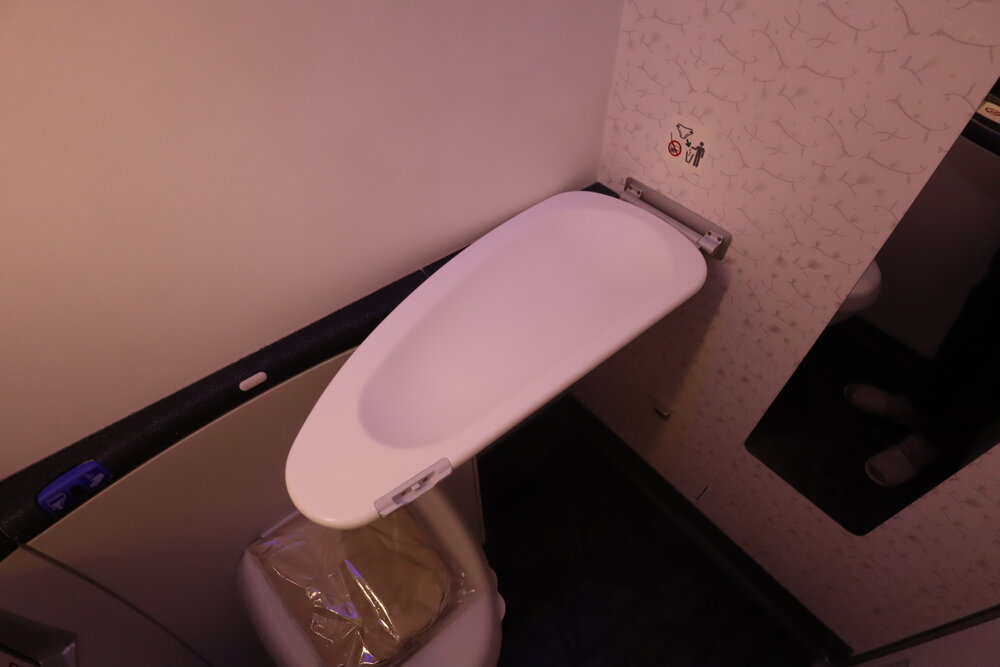
Korean Air 747 First Class – Restroom changing table
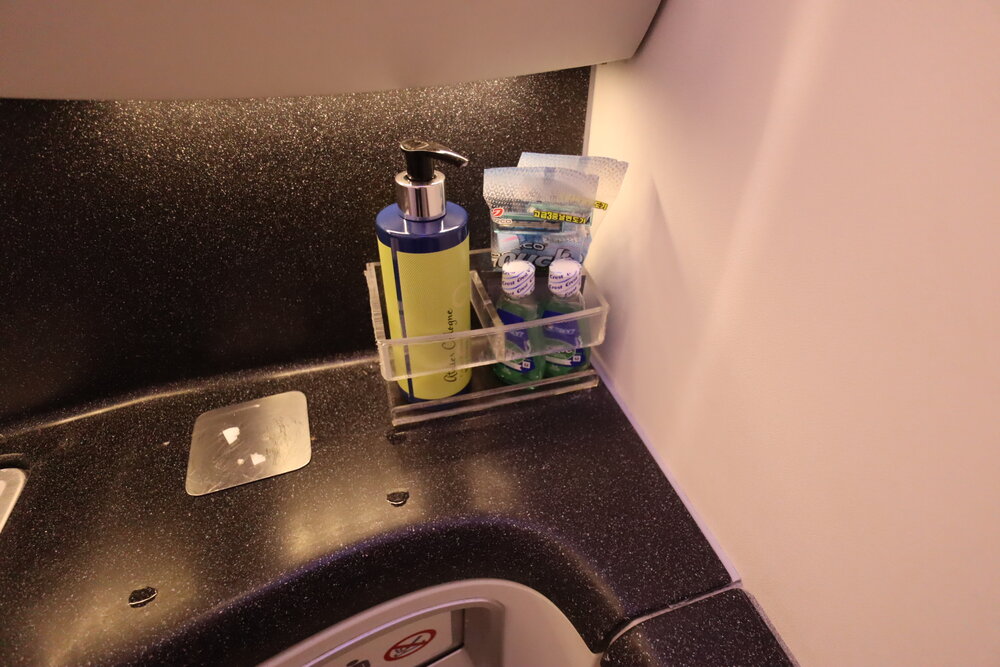
Korean Air 747 First Class – Restroom amenities
I was very ready to hit the hay in the comfort of my suite by this point, and to my delight, my bed had also been prepared in Seat 1J, consisting of a mattress pad, pillow, and blanket.
Check out those curves on the Queen of the Skies – I must say, there was something very exciting about sleeping in the very pointy end of the plane!
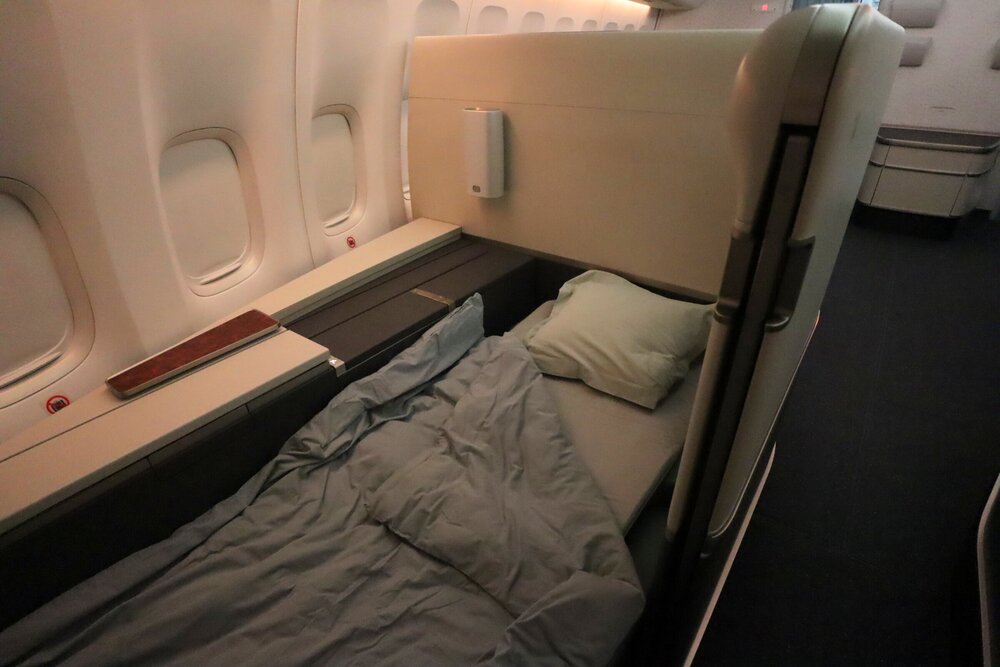
Korean Air 747 First Class – Bed
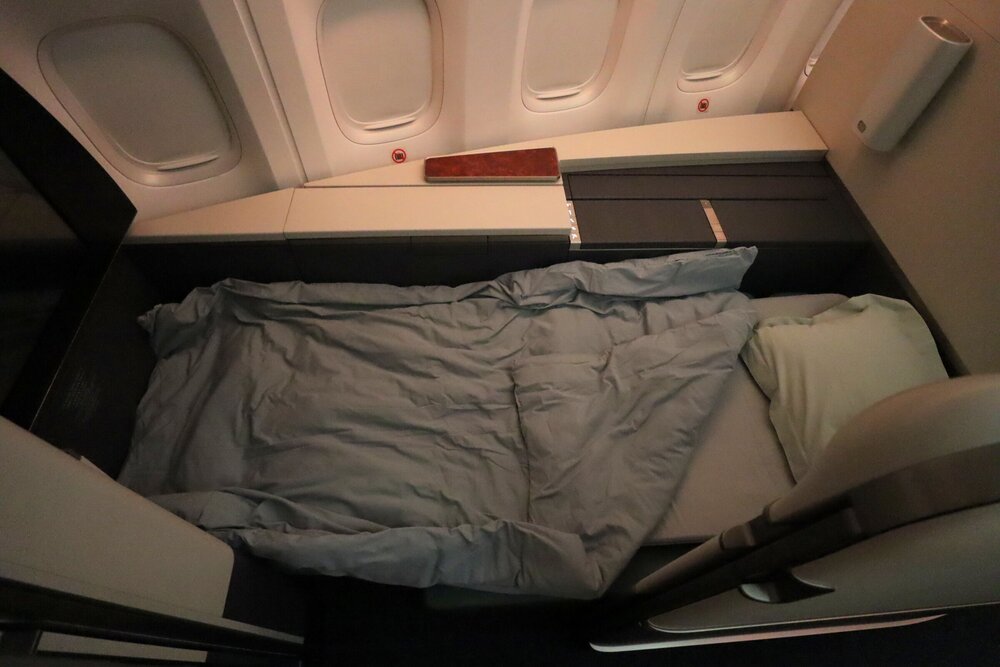
Korean Air 747 First Class – Bed
The Kosmo Suite 2.0’s doors are designed with downward-pointing slats, such that you can look out at the aisle and see what’s going on, but those outside can’t look in without peeping over the top. With the doors closed, you really do feel as though you are sleeping in your own private cocoon, and of course there was also maximum legroom if you’re the type to move around during your sleep.
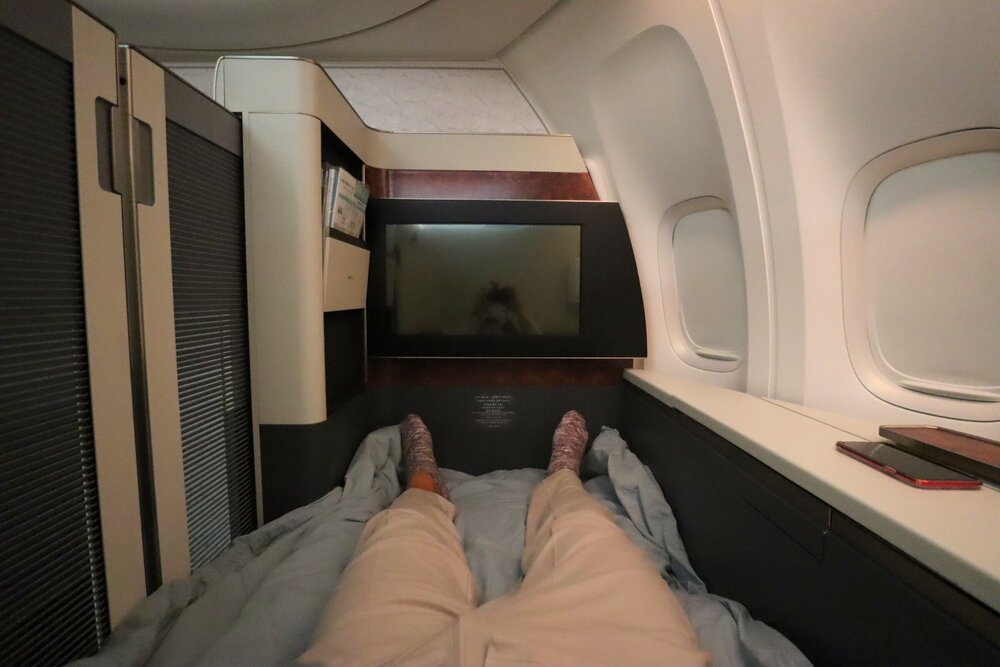
Korean Air 747 First Class – Legroom
There were about twelve hours to go when I went to bed, so I instructed the flight attendant to wake me up in seven hours’ time – I still wanted some time to revel in the First Class experience, after all!
Those seven hours passed incredibly smoothly, and given the late hour, it must’ve been some of the best sleep that I’ve gotten onboard a plane for a very long time. In fact, even after the flight attendant tried to wake me up after seven hours, I still ended up snoozing for another half an hour before I groggily made my way over back to Seat 1A.
Korean Air 747 First Class – Wifi
With Korean Air not offering any onboard wifi either (they’ve recently announced plans to introduce wifi, but this hadn’t been rolled out at the time of my flight), I didn’t have too much to occupy myself with, so I just worked offline on my laptop.
Korean Air 747 First Class – Entertainment
I also decided to have a look through the entertainment system and see if anything interested me. I’m not usually in the habit of watching films and TV shows on the plane, but who knows, maybe something would tempt me this time?
One look at Korean Air’s entertainment selection, however, and I knew it was unlikely. While many of their global peers have hundreds upon hundreds of movie and TV titles in their in-flight systems these days, Korean Air’s offering remains limited to only a handful of each.
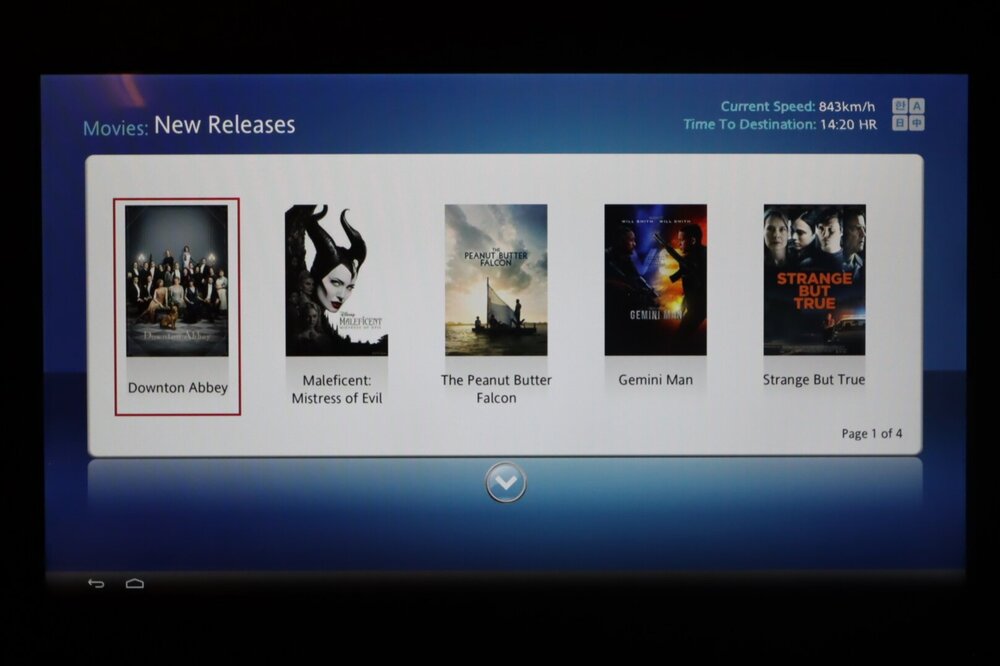
Korean Air 747 First Class – Movie selection
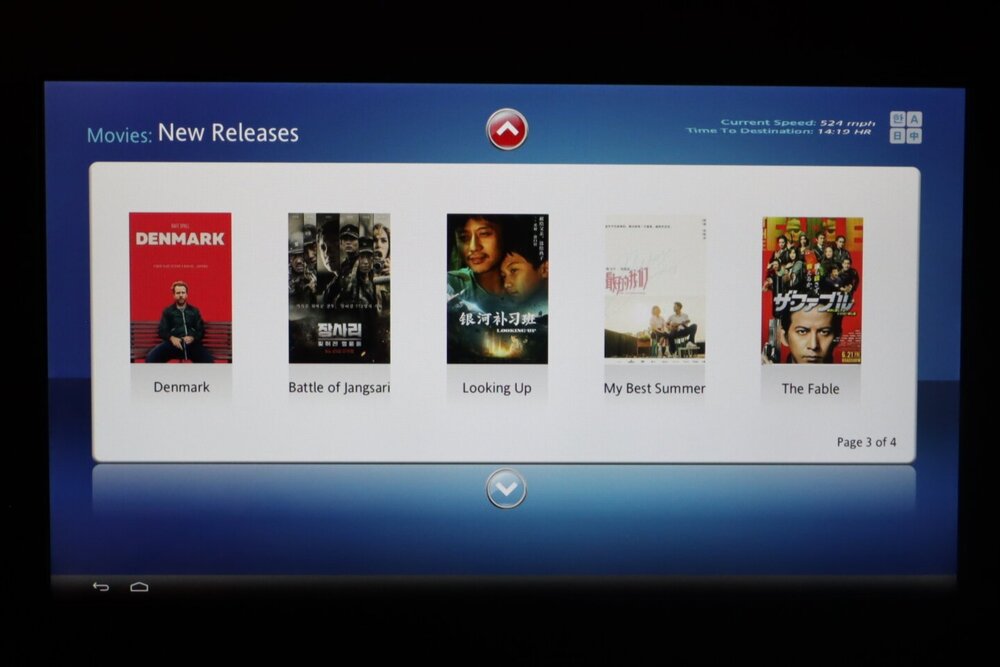
Korean Air 747 First Class – Movie selection
Moreover, the IFE system was rather slow to respond to the entertainment controller, and that it could certainly use a software update to be more in line with the futuristic look of the hard product.
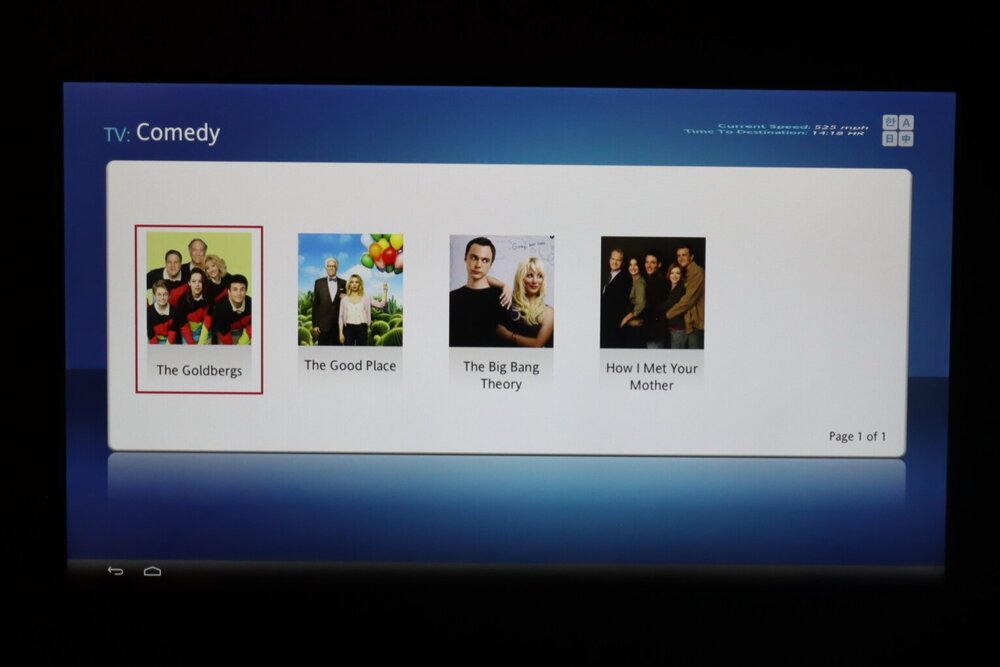
Korean Air 747 First Class – TV selection
Our flight was passing over Siberia at this point, having taken the polar route over to East Asia.
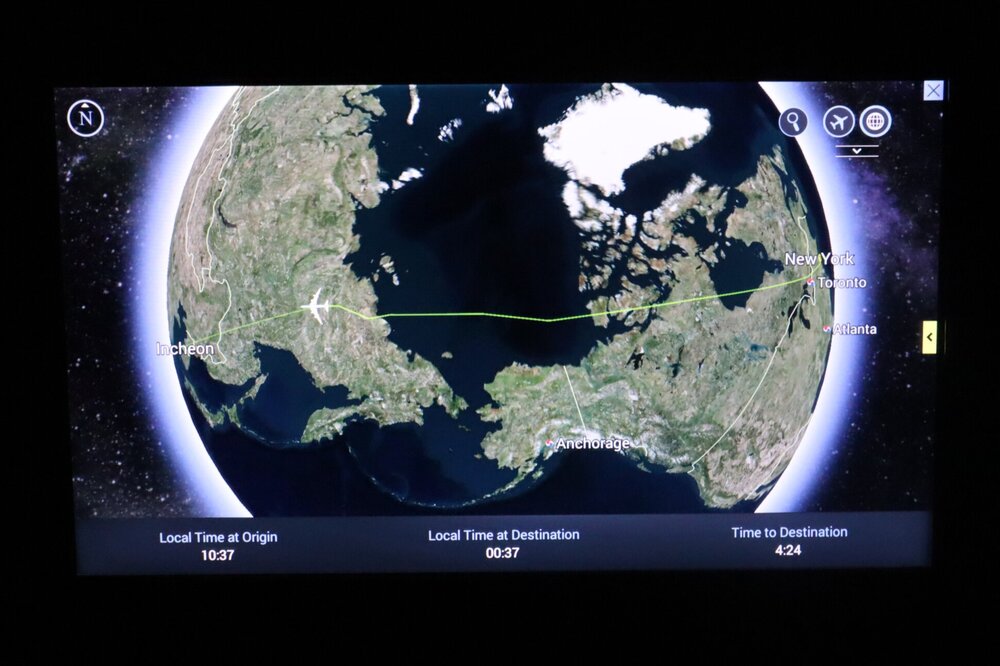
Korean Air 747 First Class – Airshow en route to Seoul
Korean Air 747 First Class – Snack Service
The flight attendant was proactively on hand to check if I needed anything, and I knew exactly what I wanted: a cup of black tea, followed by a bowl of Korean ramen.
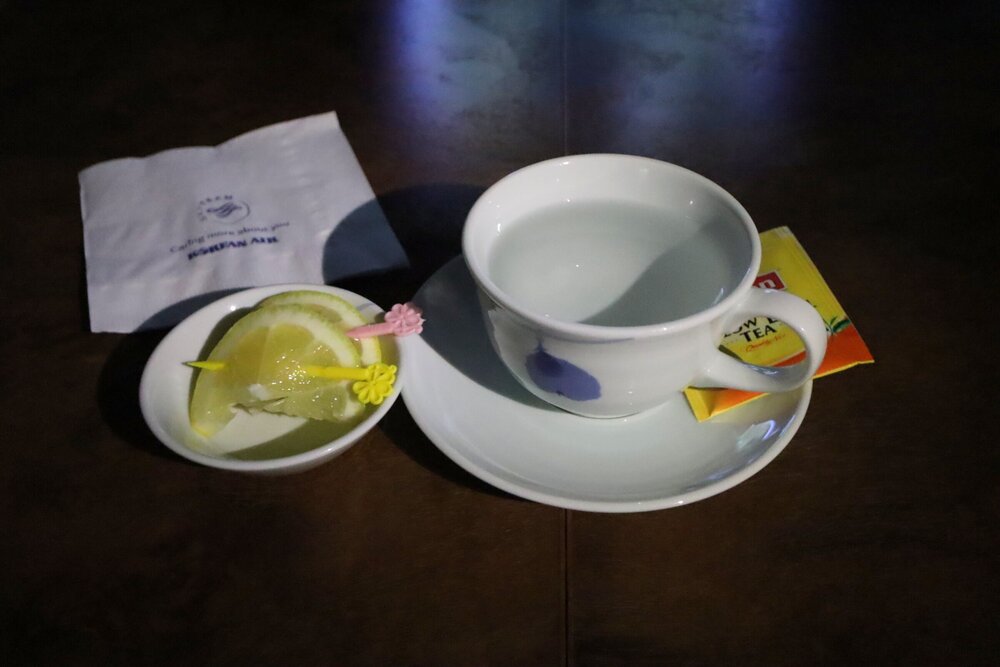
Korean Air 747 First Class – Black tea
As longtime readers will know, I’m all about sampling the noodle dishes on the snack menu whenever I’m flying with East Asian airlines, so you can bet that I’ll be having a bowl of the ramen on Korean Air First Class (especially when the rest of the menu is reduced).
The ramen was served with an assortment of side dishes, and the tender noodles in a spicy broth was exactly what I needed to wake me up.
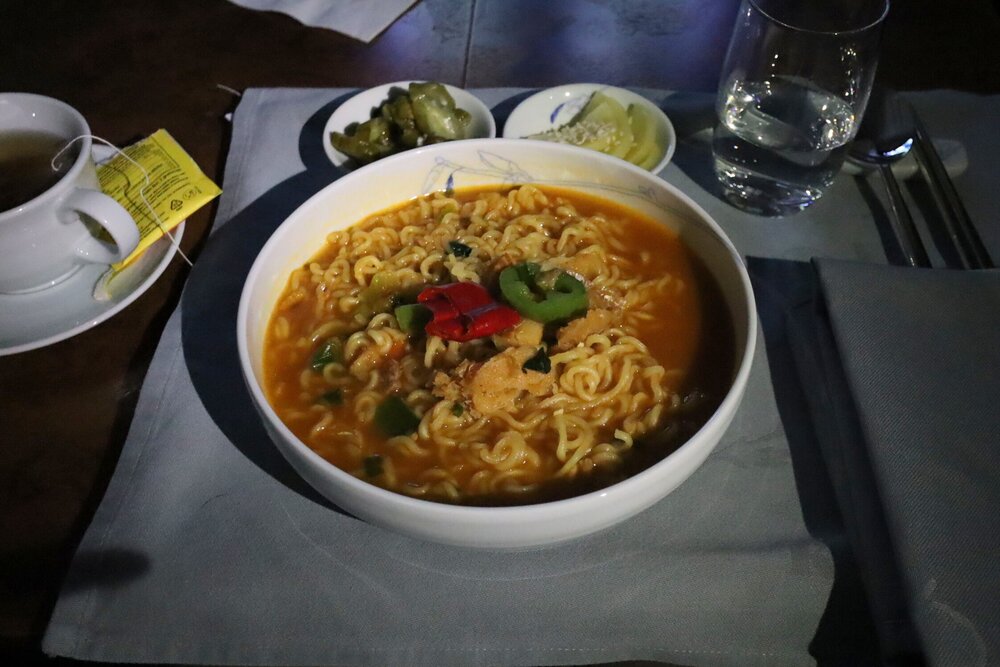
Korean Air 747 First Class – Ramen with side dishes
Polishing off every last bite, I then decided to slowly savour the rest of the flight over some Johnnie Walker Blue Label whiskey, since I may as well take advantage of all these First Class travels to develop my whiskey palate a little.
Having said that, I still can’t tell you exactly what sets Blue Label apart, other than the fact that I feel fancy when drinking it. Maybe one day I’ll be able to. The whiskey was accompanied by some almonds, but again, the experience would’ve been better if those were lightly toasted.
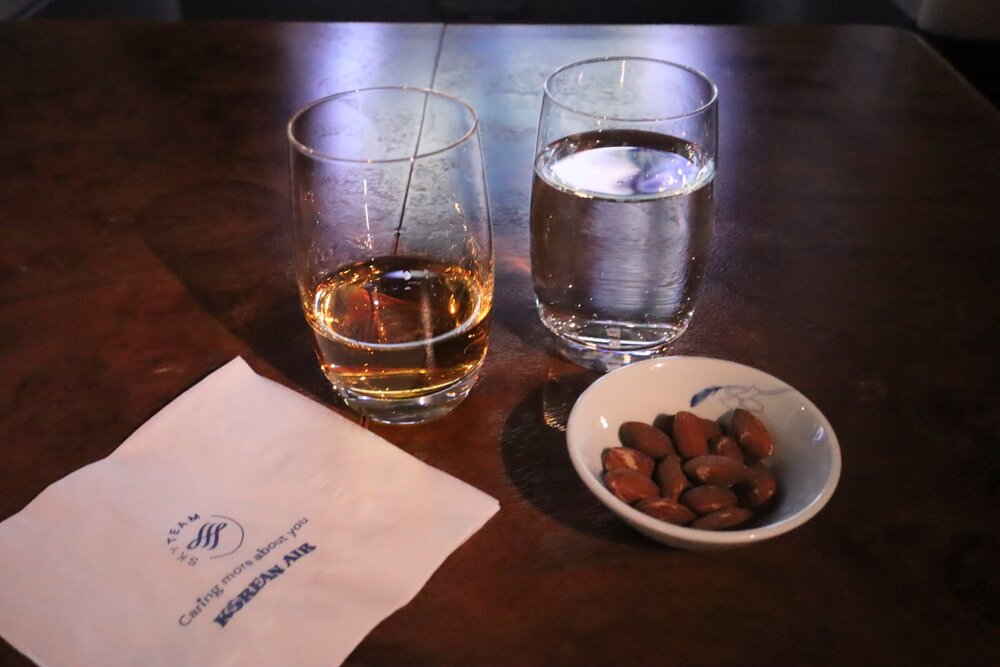
Korean Air 747 First Class – Johnnie Walker Blue Label whiskey
For the next two hours, I continued to work offline on my laptop, finding the lack of onboard wifi to be quite regrettable.
Then, with about an hour and a half before landing, it was time to commence the breakfast service. Just like supper, the breakfast menu was reduced as well, with yogurt and cereal as the appetizer followed by a choice of Korean or Western mains.
The yogurt and cereal appetizer was highly customizable. The flight attendant confirmed with me if I’d prefer strawberry or plain yogurt (strawberry all the way), almonds or cranberries as garnishes (cranberries please, I’d had enough almonds already), low-fat milk or regular (low-fat would be wiser for my waistline, considering the bountiful bibimbap I had eaten), and rice crispies or cornflakes (is this even a question?)
Despite the customizations, the yogurt and cereal were about as unremarkable as you’d expect those dishes to be.
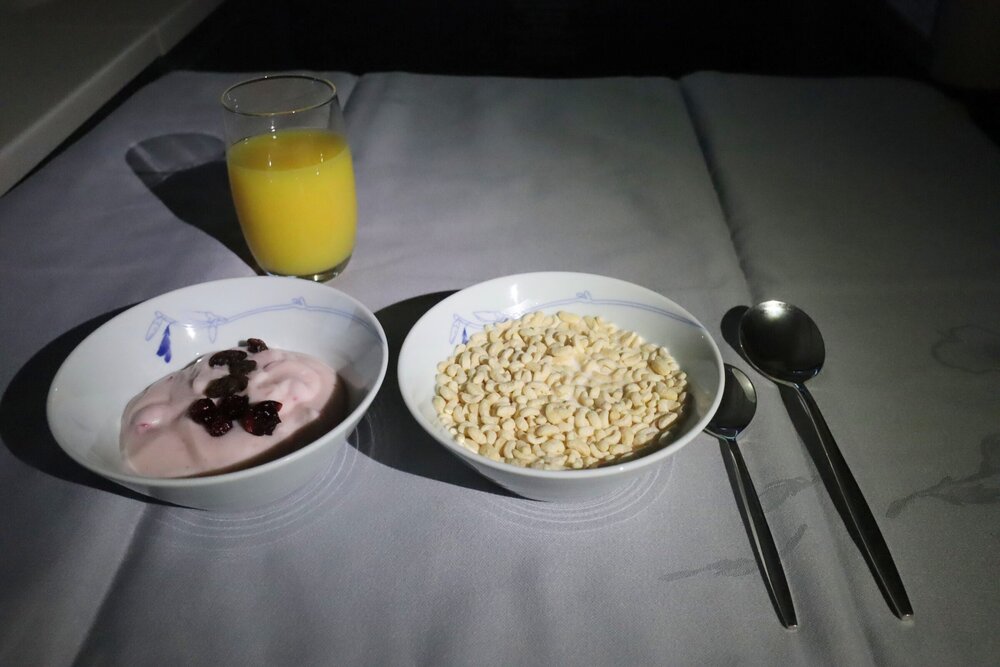
Korean Air 747 First Class – Yogurt and cereal
The Korean main course would be another exquisitely presented affair, with one central soup bowl surrounded by several side dishes and accompanied with another bowl of rice.
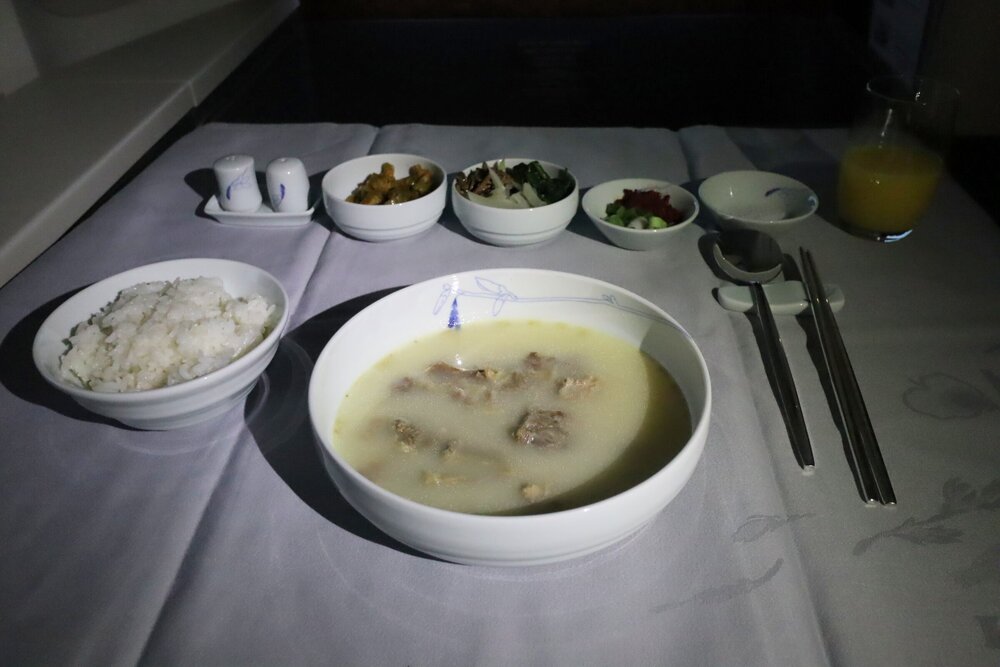
Korean Air 747 First Class – Korean oxtail soup
In terms of the taste, however, I ended up wishing I had tried the Western item instead – that’s because the Korean oxtail soup, as a breakfast dish, is ostensibly meant to be lighter in taste, whereas in general I prefer to have more umami in my soups. I ended up adding a lot of salt and asking for another tube of the gochujang sauce to give it a little extra kick.
Breakfast would conclude with another fruit plate, as well as a cappuccino to bring the flight to a smooth finish.
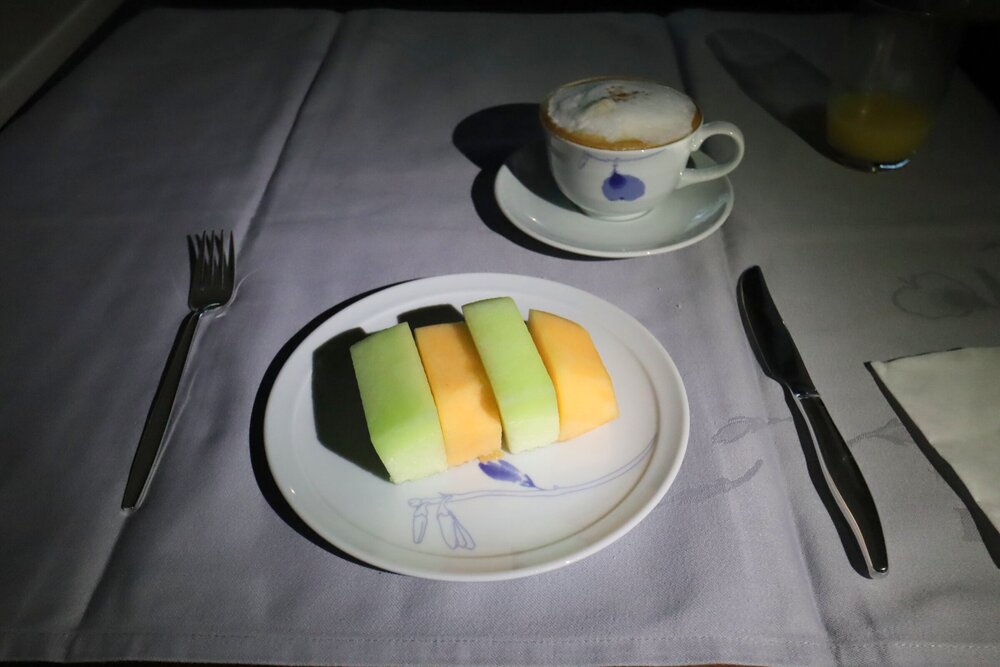
Korean Air 747 First Class – Fruit and coffee
Indeed, by this point our flight had just about concluded its signature evasive technique over the DPRK, meandering across the East China Sea in the direction of Seoul Incheon Airport.
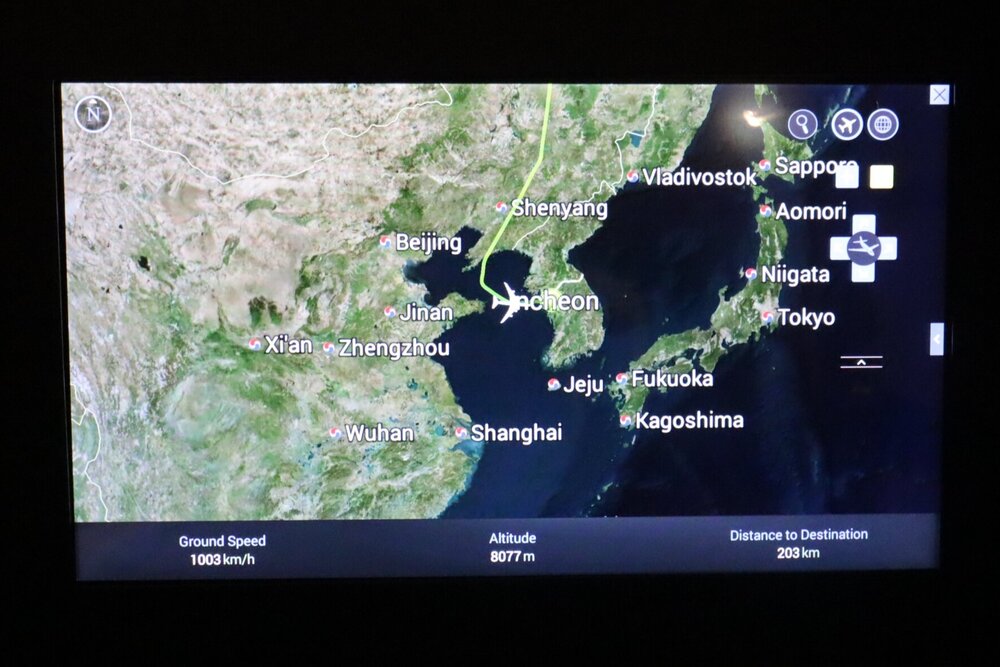
Korean Air 747 First Class – Airshow en route to Seoul
We would land at 5am local time under the cover of night, so there weren’t any window views to speak of until the bright lights of the seaside Incheon International Airport swept into view.
Sitting in the nose of the Boeing 747-8, I was the first passenger to feel the full weight of the aircraft touching down underneath us as we landed, bringing my maiden flight on Korean Air First Class to an end.
Conclusion
As I disembarked from Korean Air First Class, only to be chased down by one of the crew members who noticed that I had left my passport in one of the storage nooks, my impressions were extremely, but not overwhelmingly, positive.
Korean Air gets a lot of things right: the intimate six-seater arrangement in First Class on the 747, the modern cabin design, and the swanky and spacious Kosmo Suites 2.0 all contribute to a well-rounded hard product.
At the same time, just like many of their East Asian peers, their service is outstanding, if a little more reserved in the Korean style. In terms of the food, I’ll never fail to be impressed by a delicious serving of bibimbap and bulgogi in the sky, although I would’ve liked to sample the full dinner menu on a non-overnight flight to get the full experience.
Nevertheless, there are numerous little things that could be improved, which in my view leaves Korean Air trailing slightly behind the world’s best First Class products. With the baby-blue seat finishes, the cabin can be accused of looking a little bit like a sterile hospital waiting room; in addition, the in-flight entertainment was a noticeable weak point that shouldn’t take too much effort to be improved.
I’m thrilled to have tried Korean Air First Class for myself, especially while fulfilling a big aviation dream by flying in the nose of the 747, and I’d certainly fly with them again if the circumstances were right.
However, unless a very compelling way to earn Korean Air SKYPASS miles arises before the program devalues in April 2021, I probably wouldn’t encourage you to go too far out of your way to try it, as there happen to be better First Class offerings out there that are also easier to book.







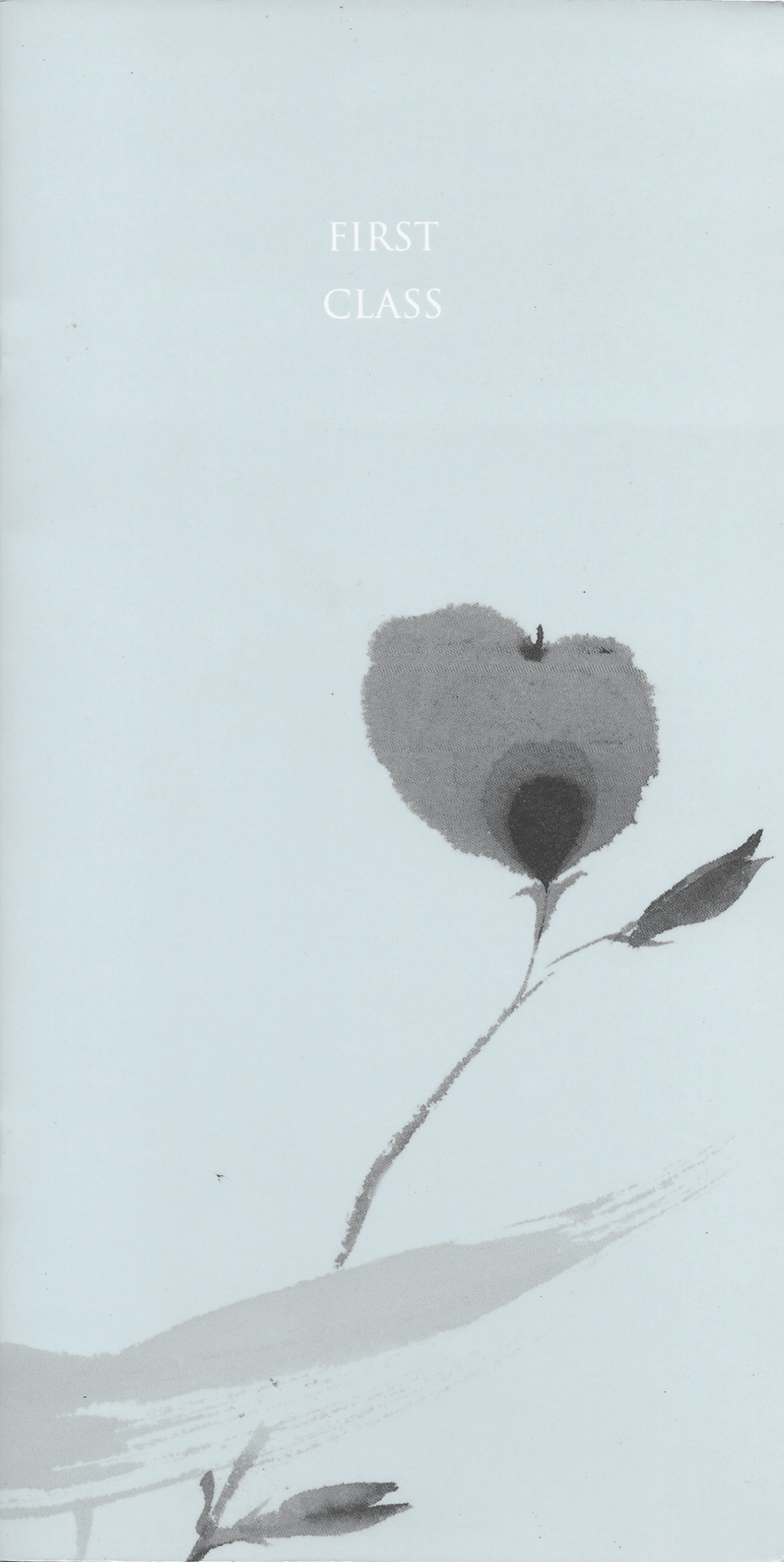
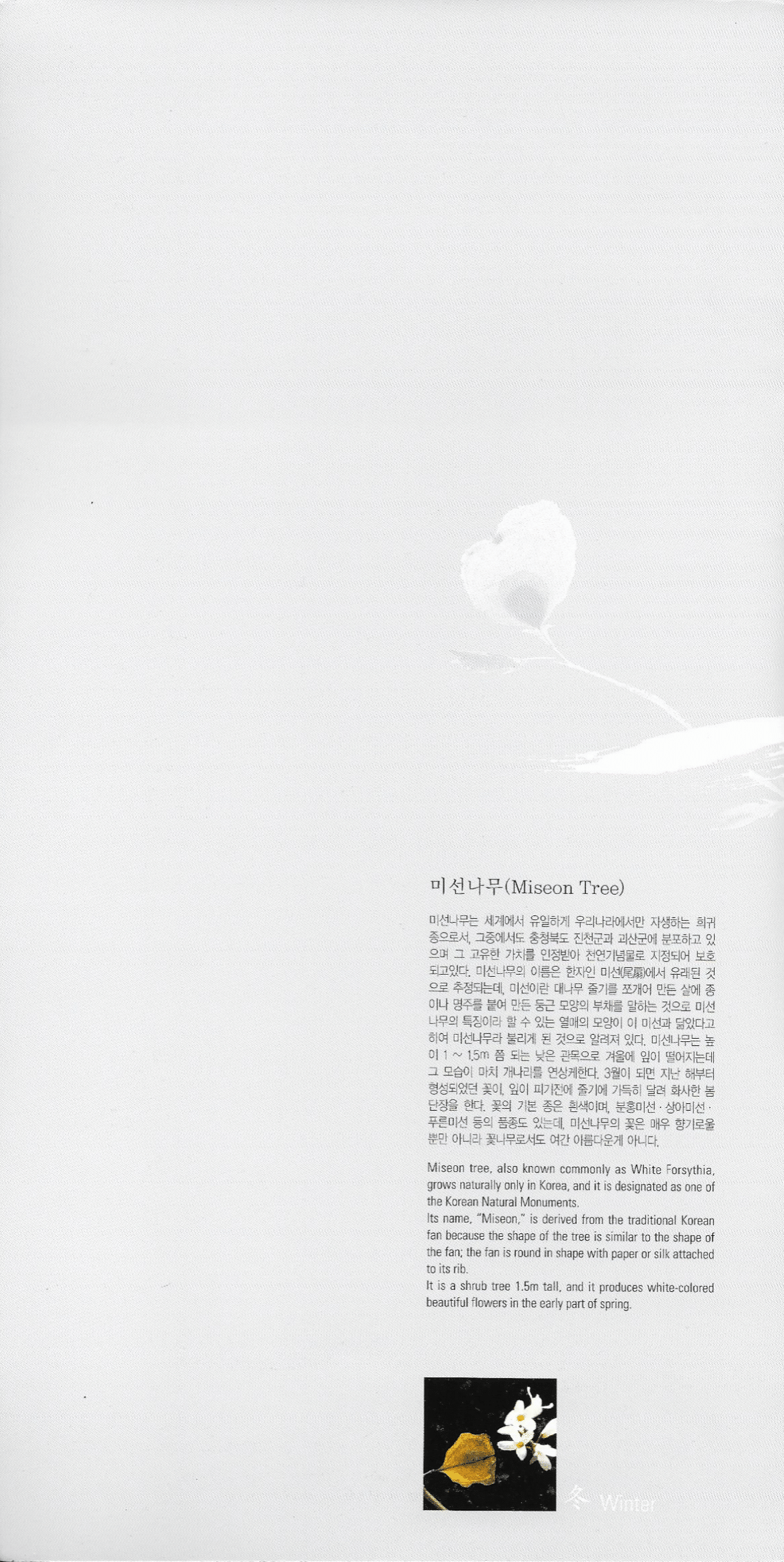
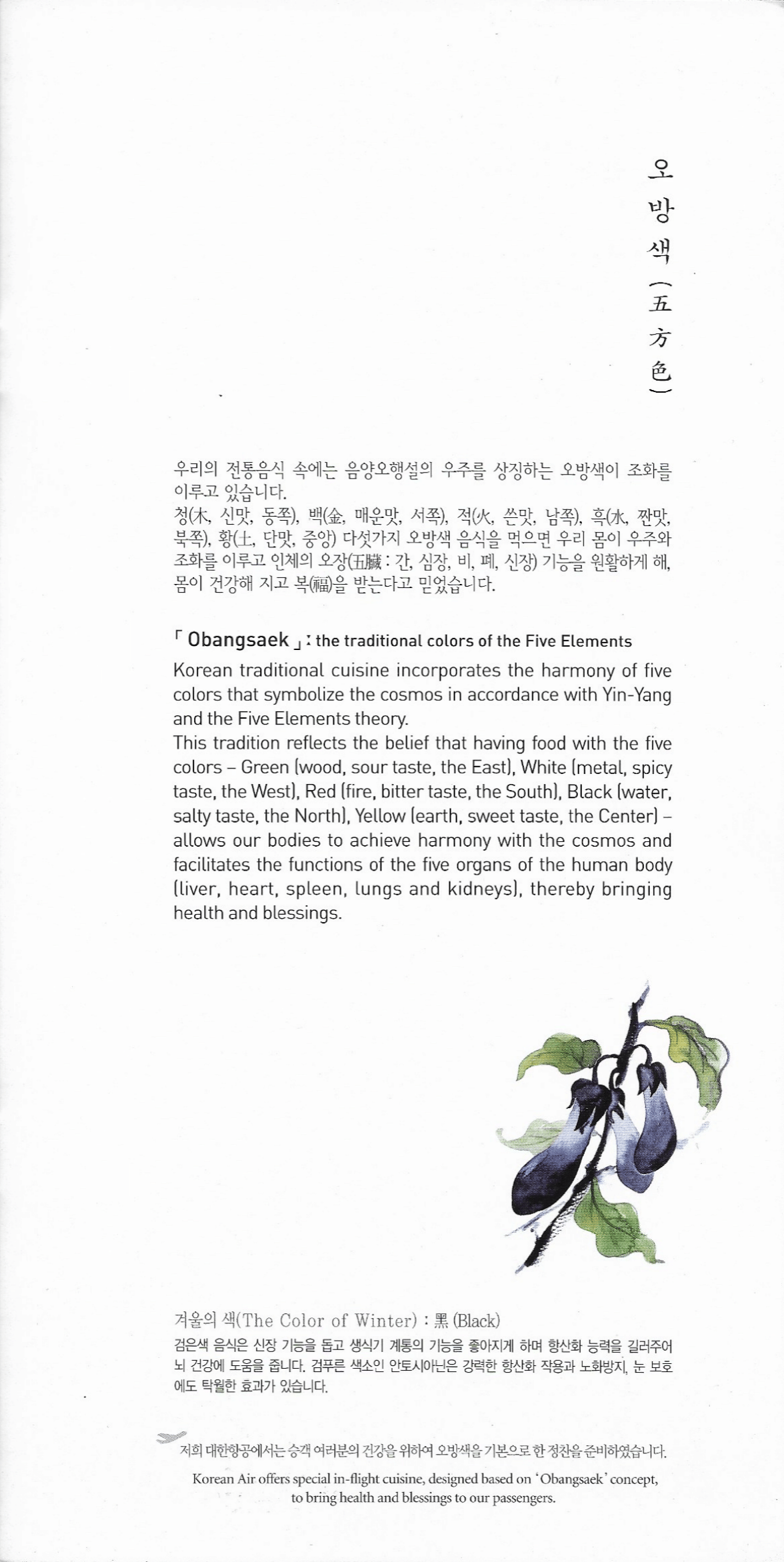
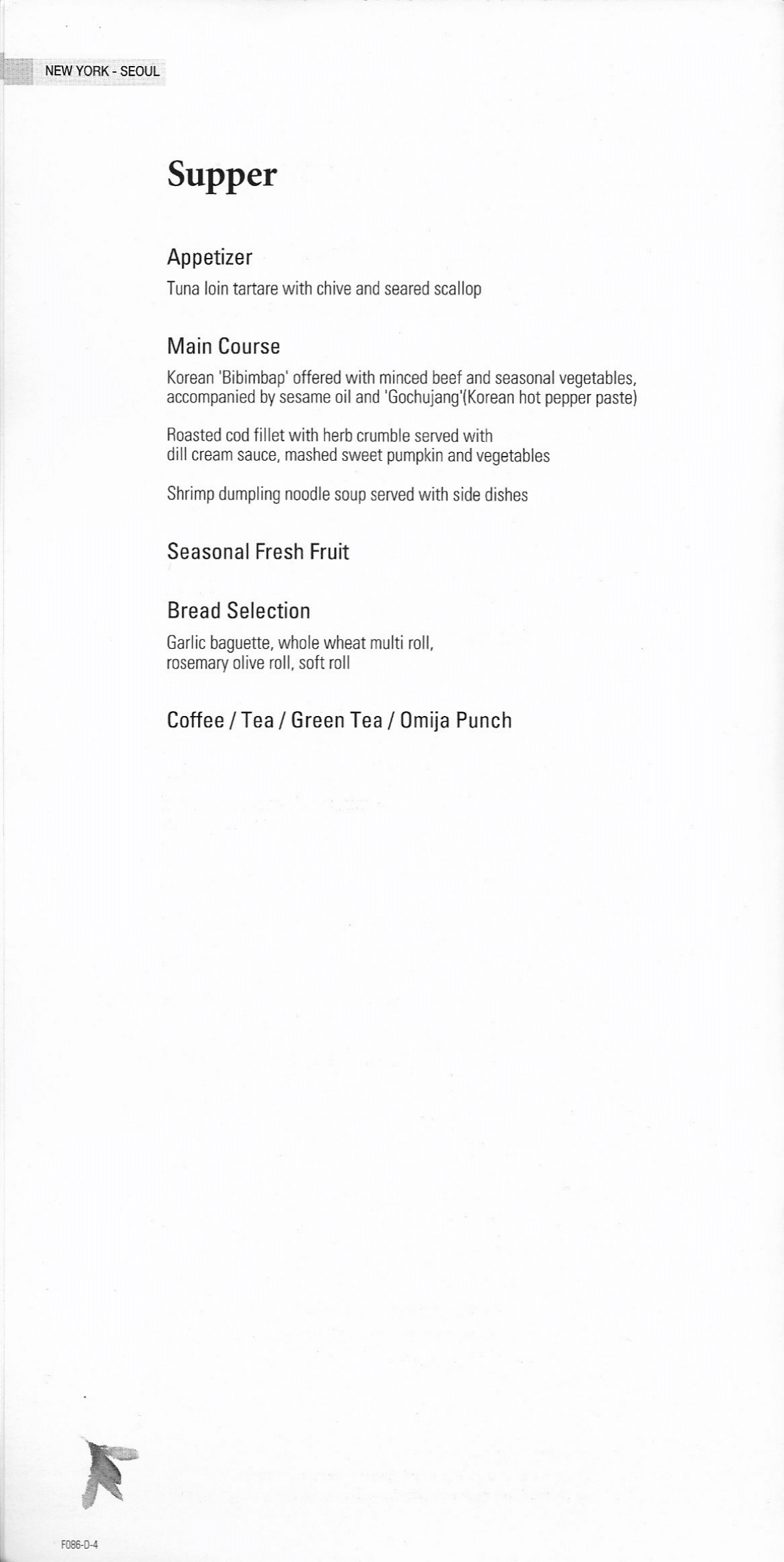
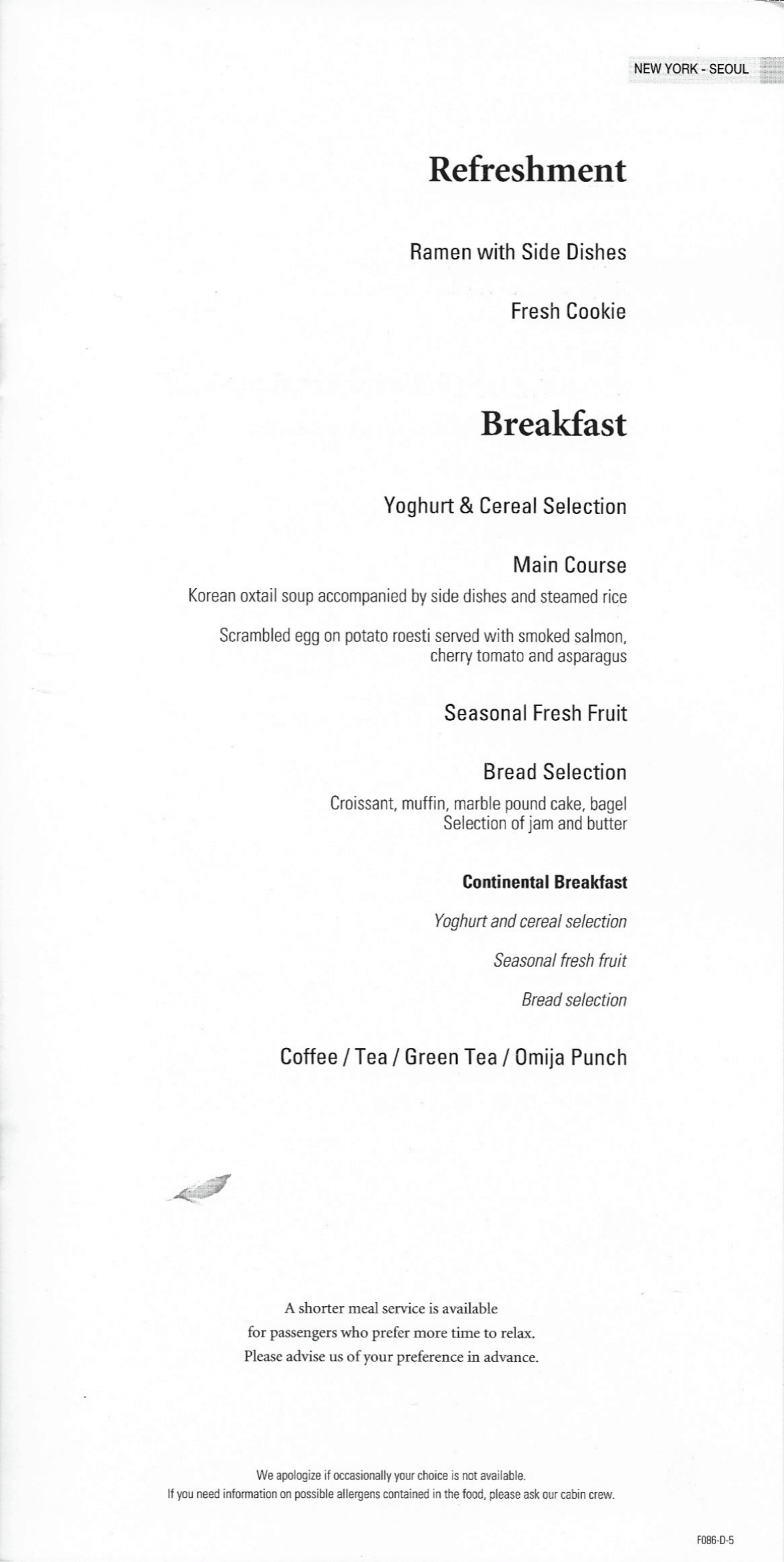
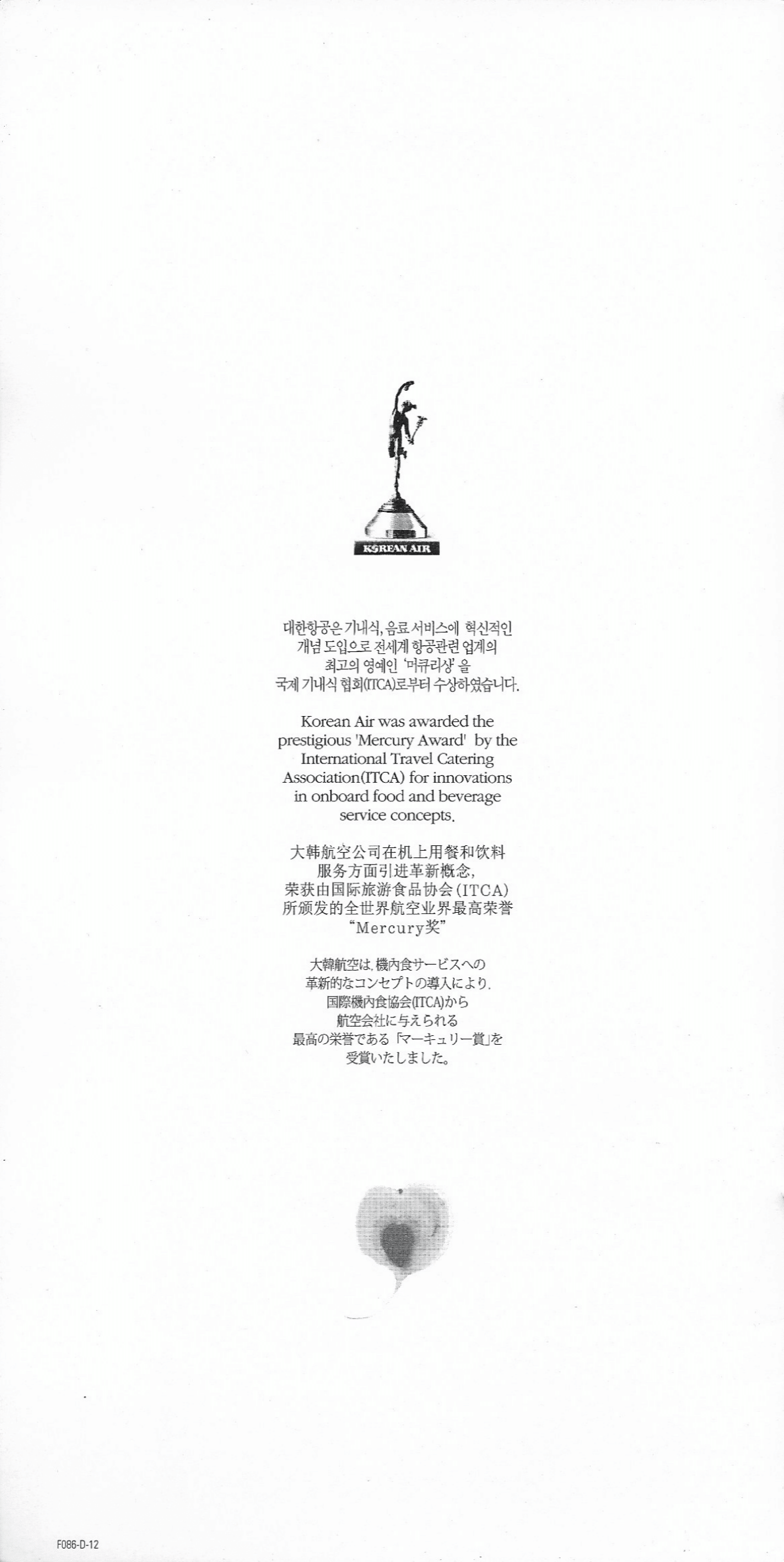
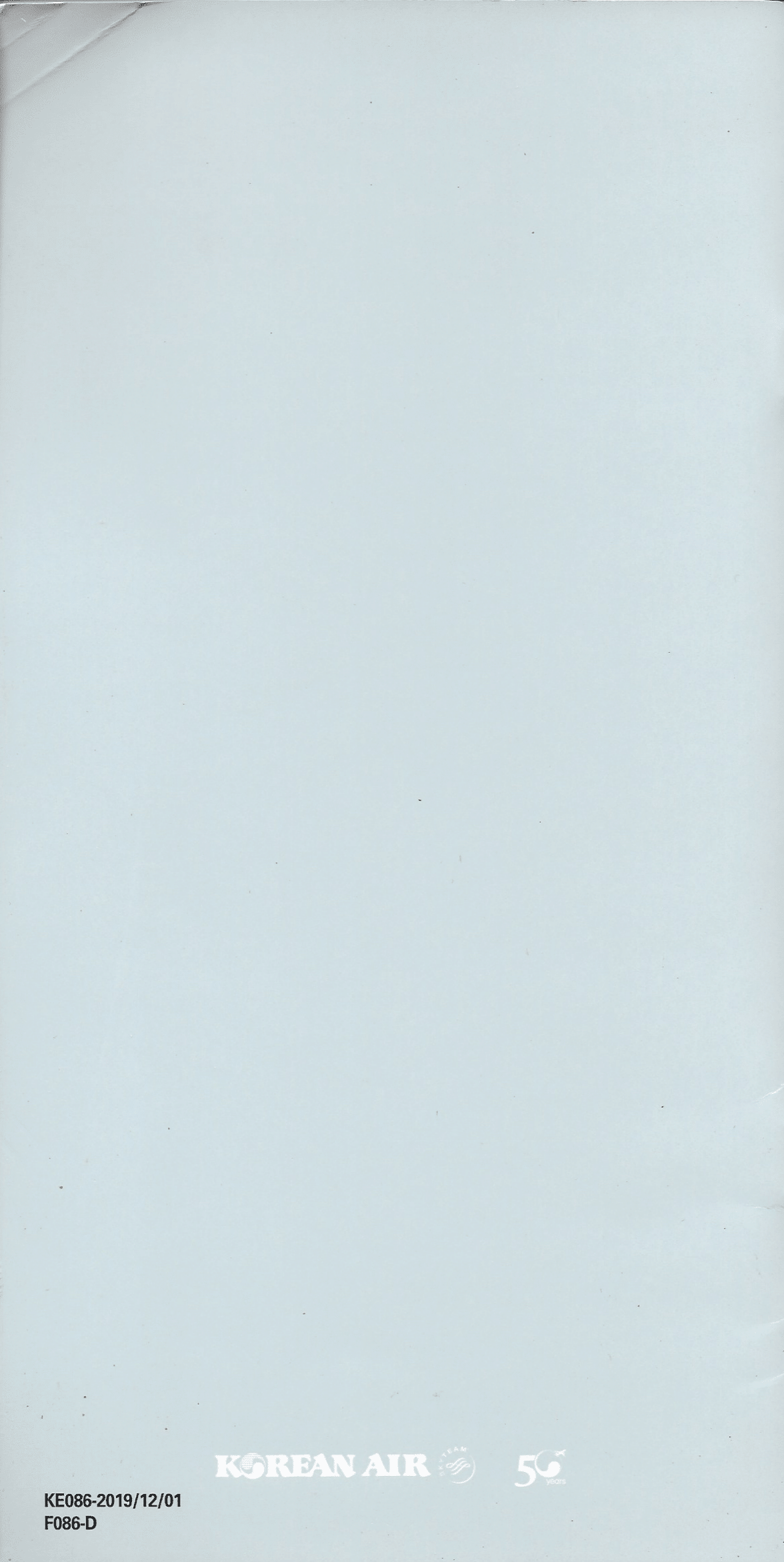

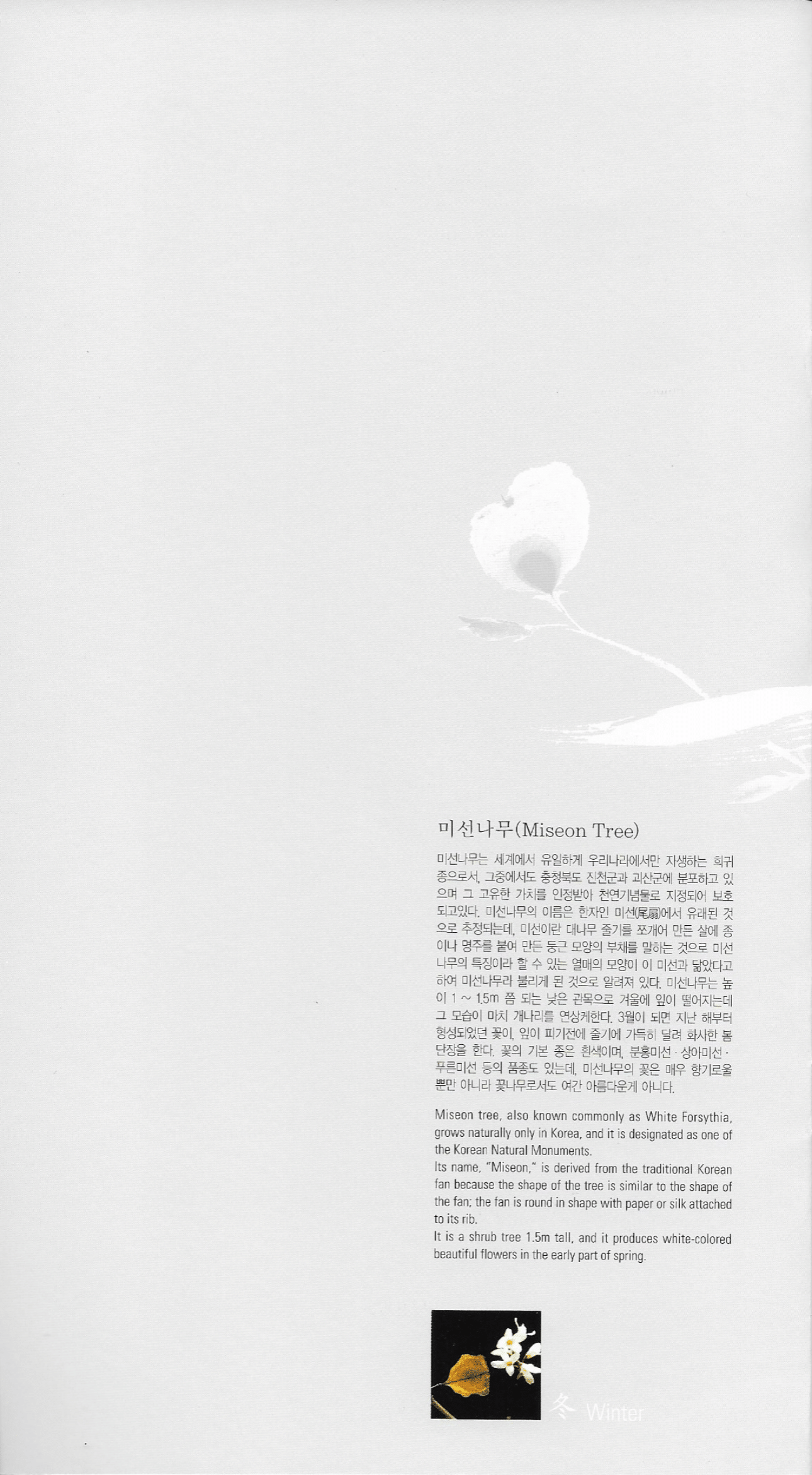
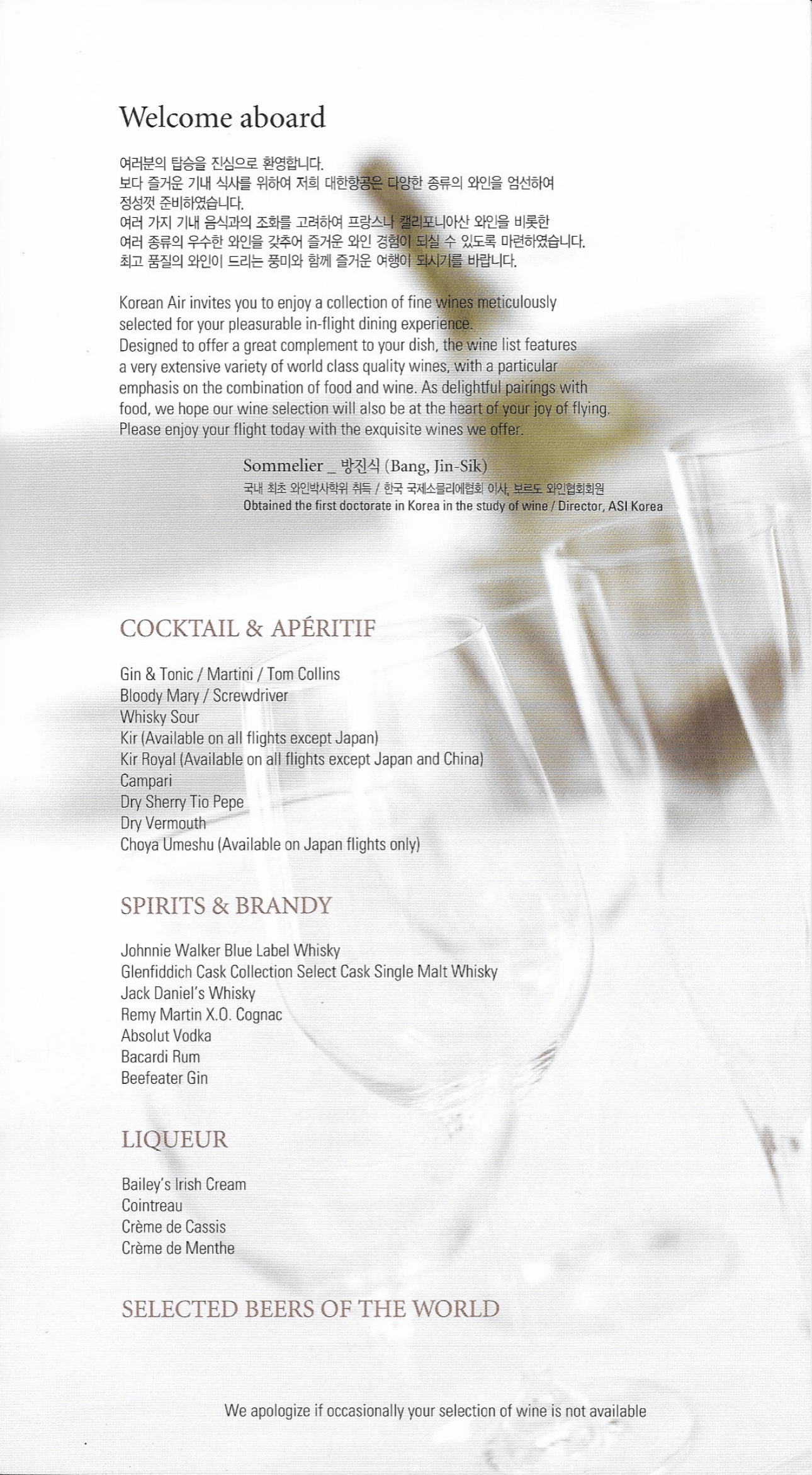
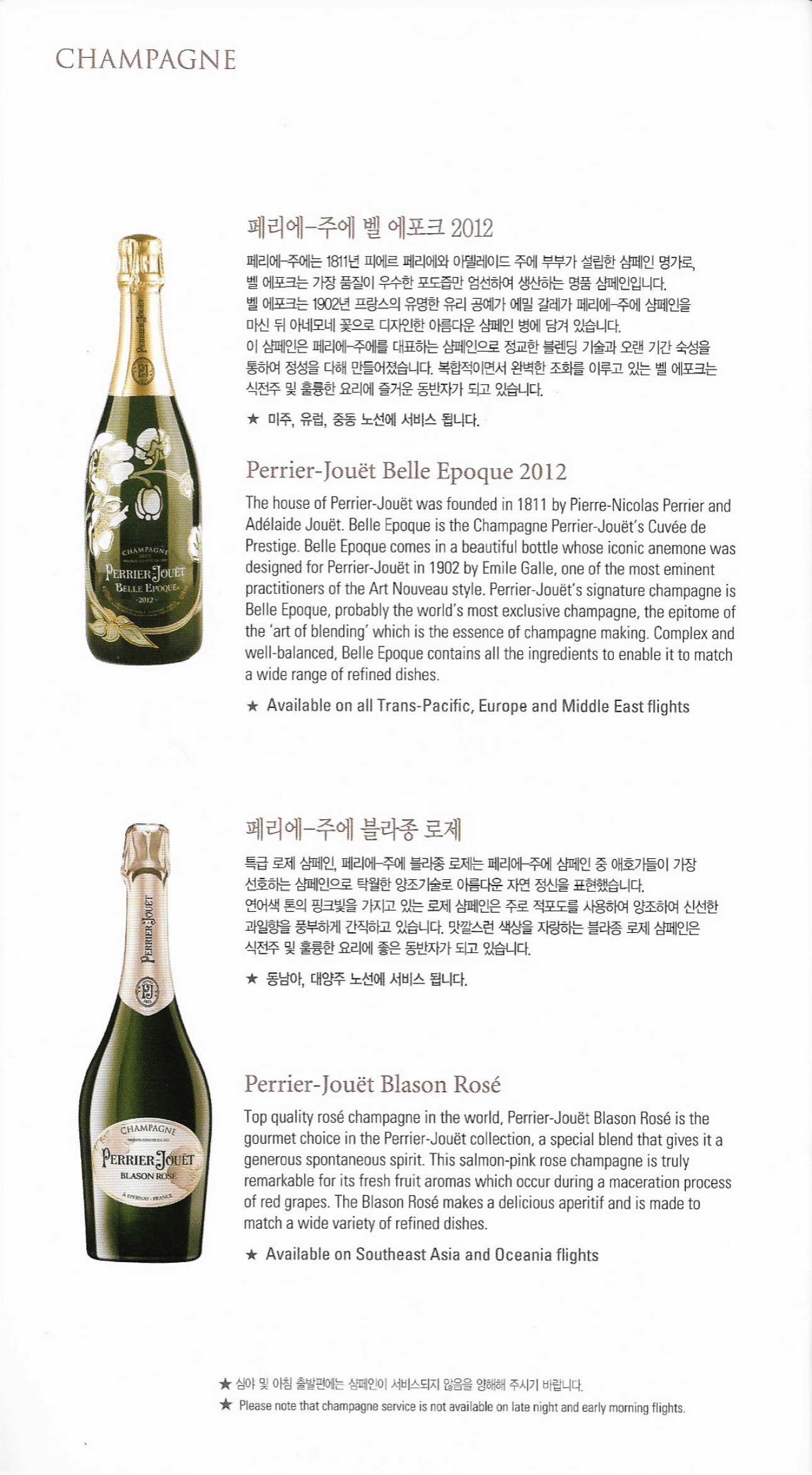
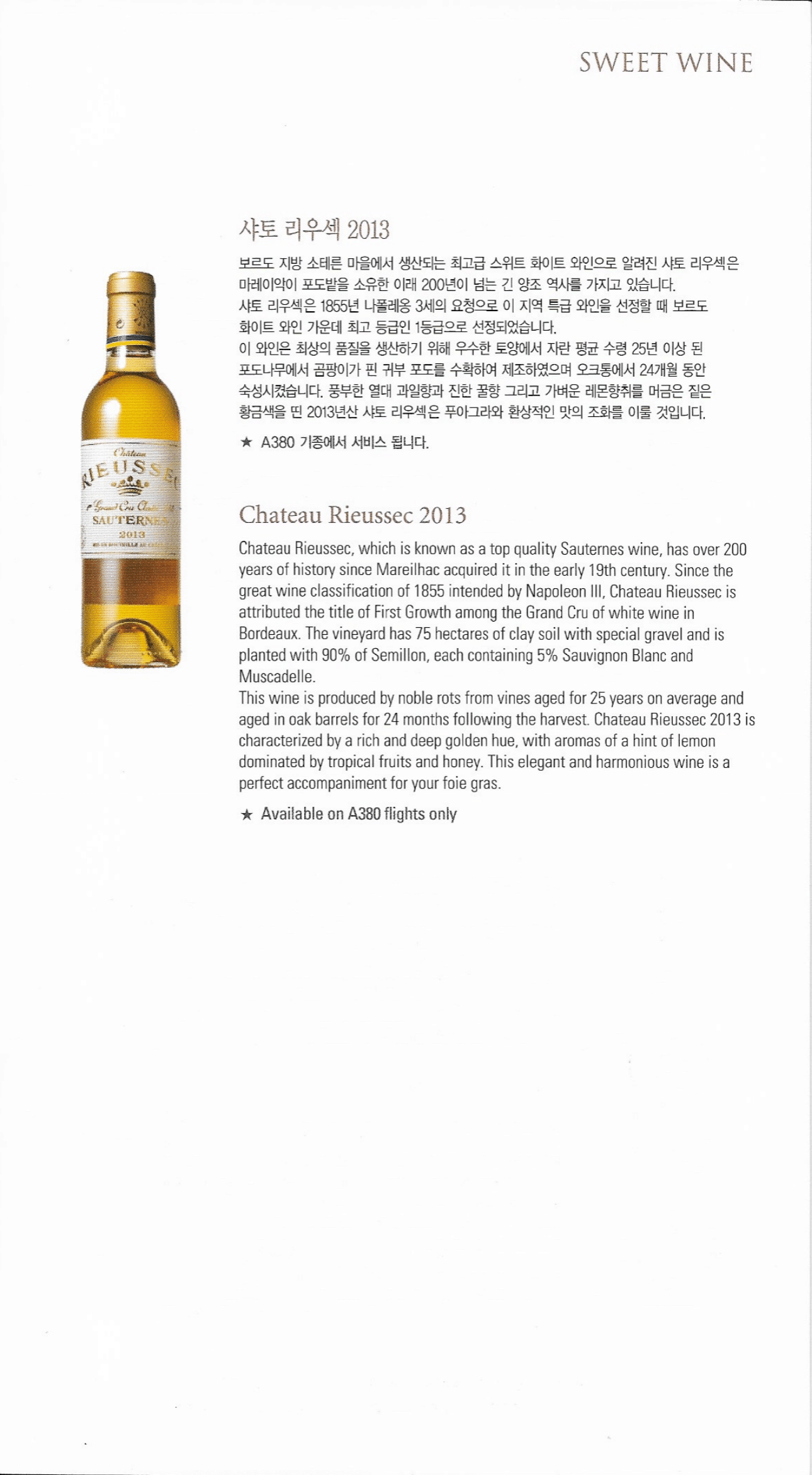

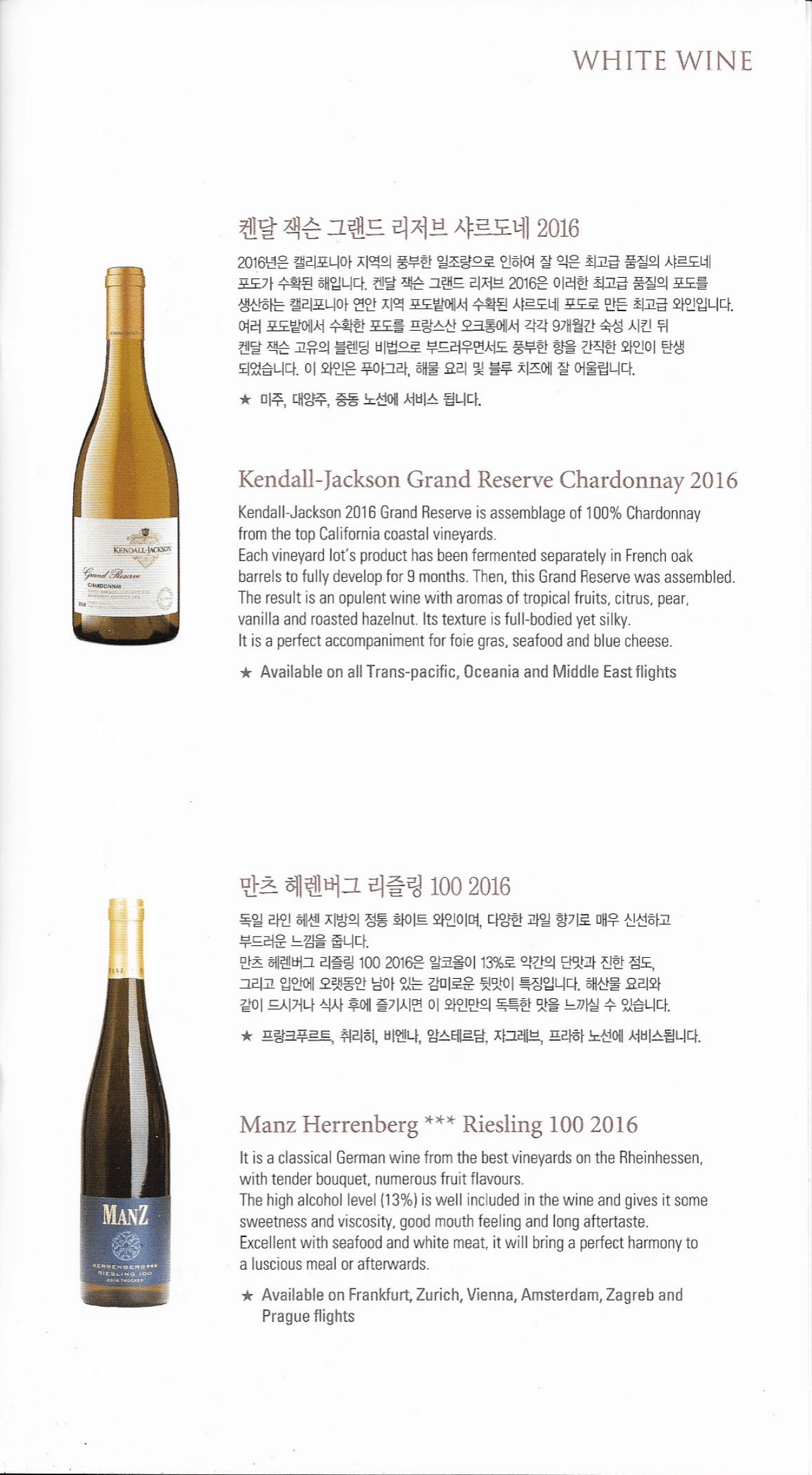
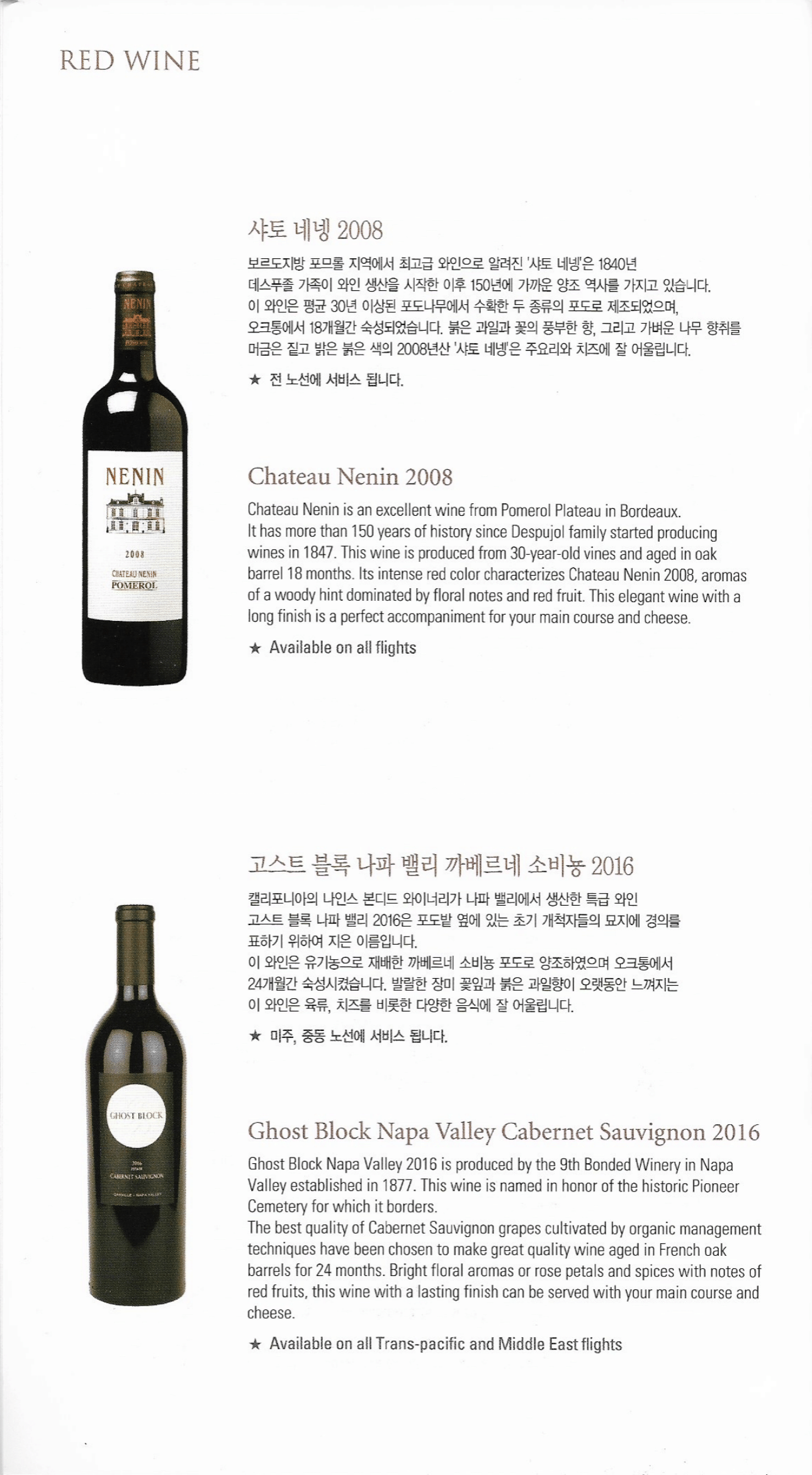
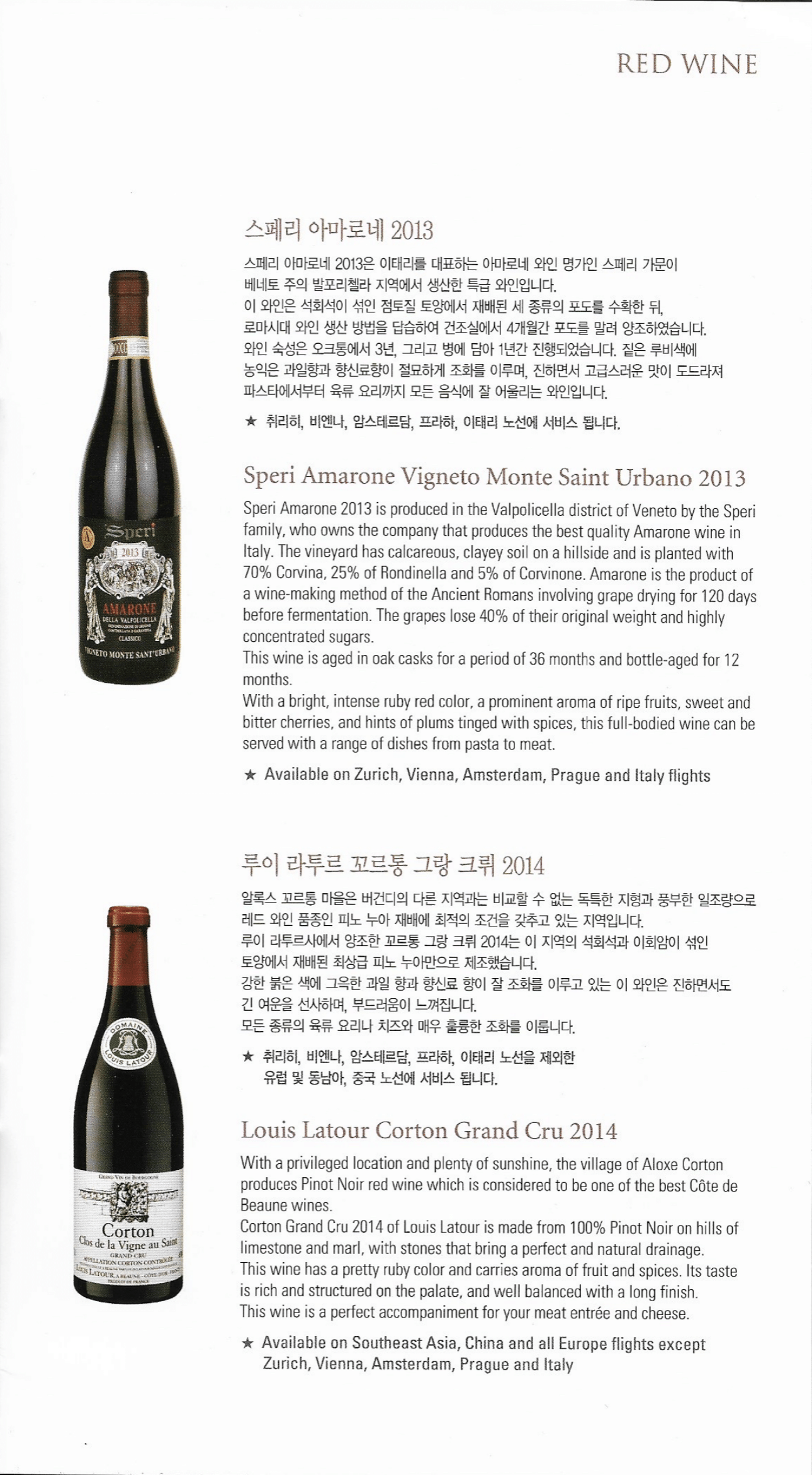
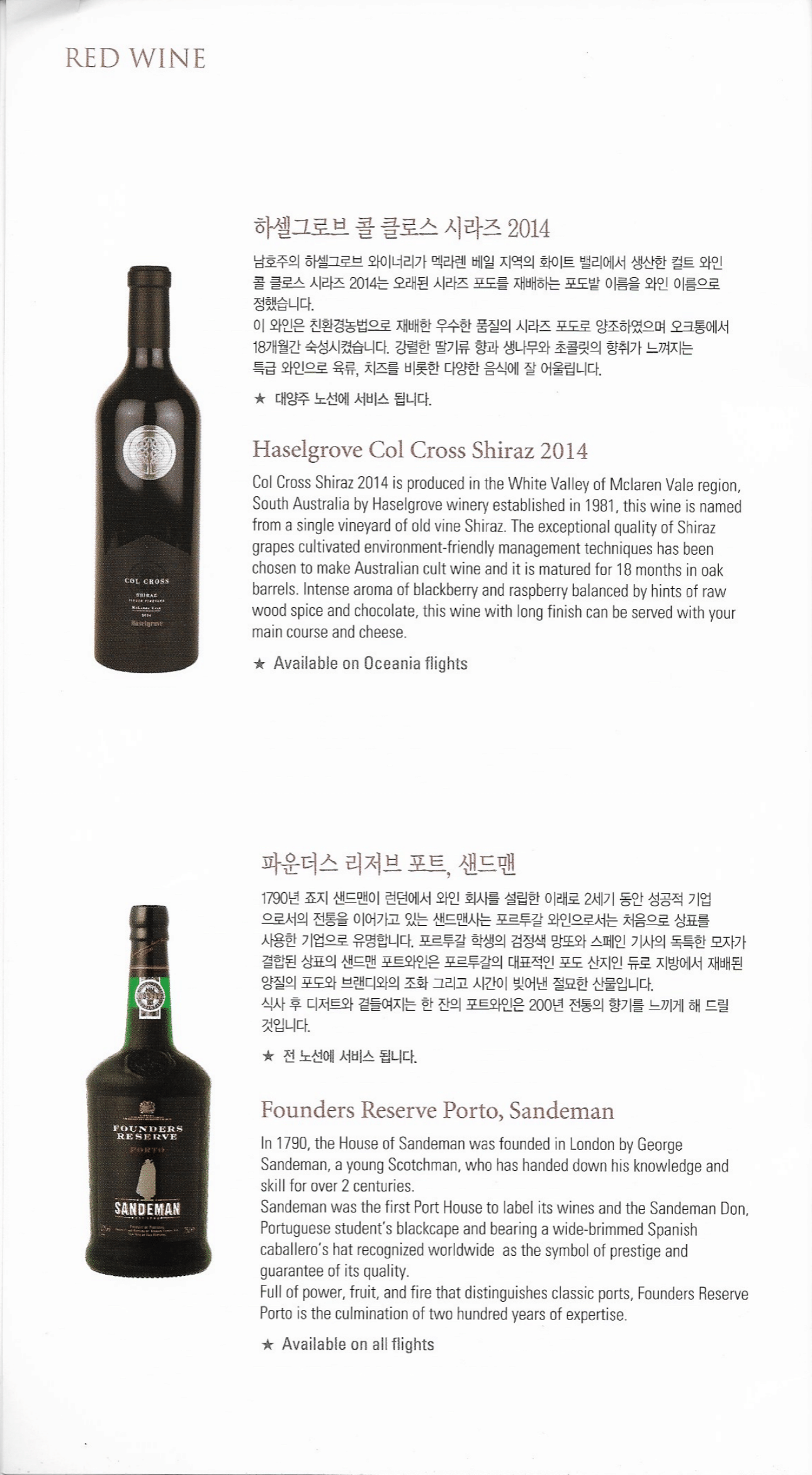
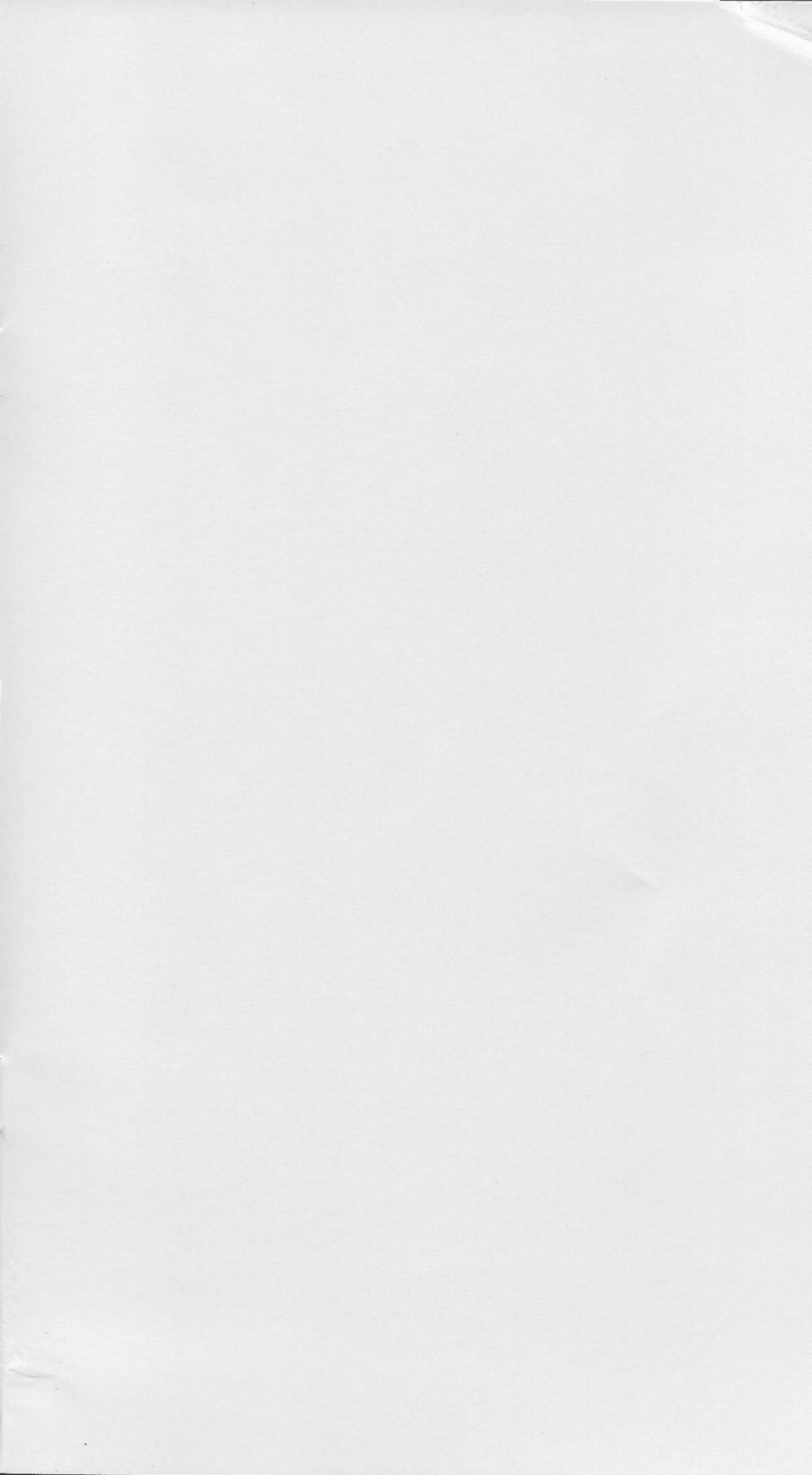
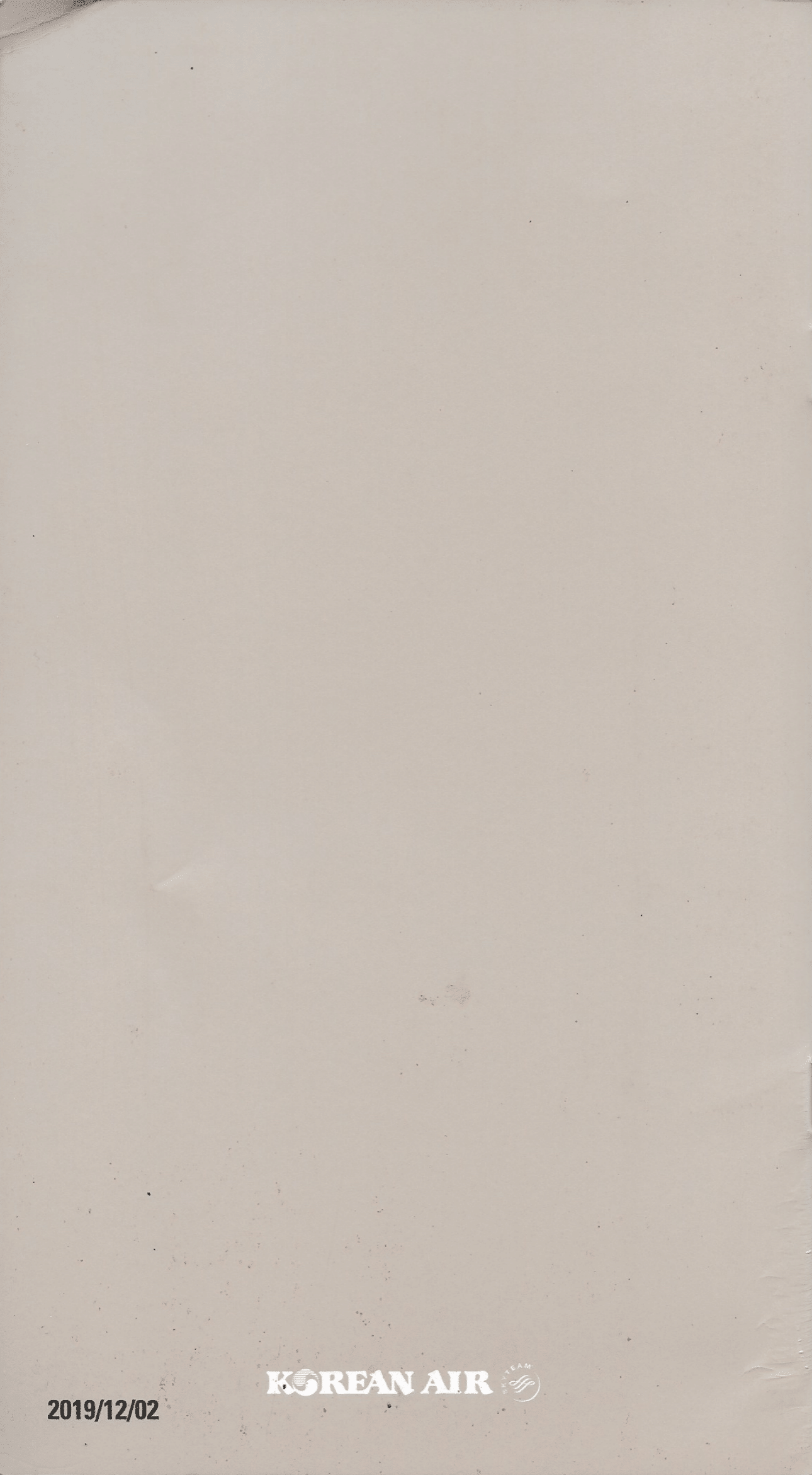











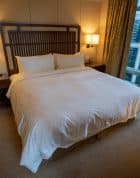


The Korean air colour palate matches those we have in hospitals in the UK. The seats particularly match the blue recliner your sit in pre scheduled surgery until you get a bed!
A bit disappointing to see that the amenity kit is the same as the business class one I got in Oct.
I was pretty disappointed that it was a bright blue rubber kit in the first place, which didn’t have much of a premium feel to it, so I suppose it’s not too surprising.